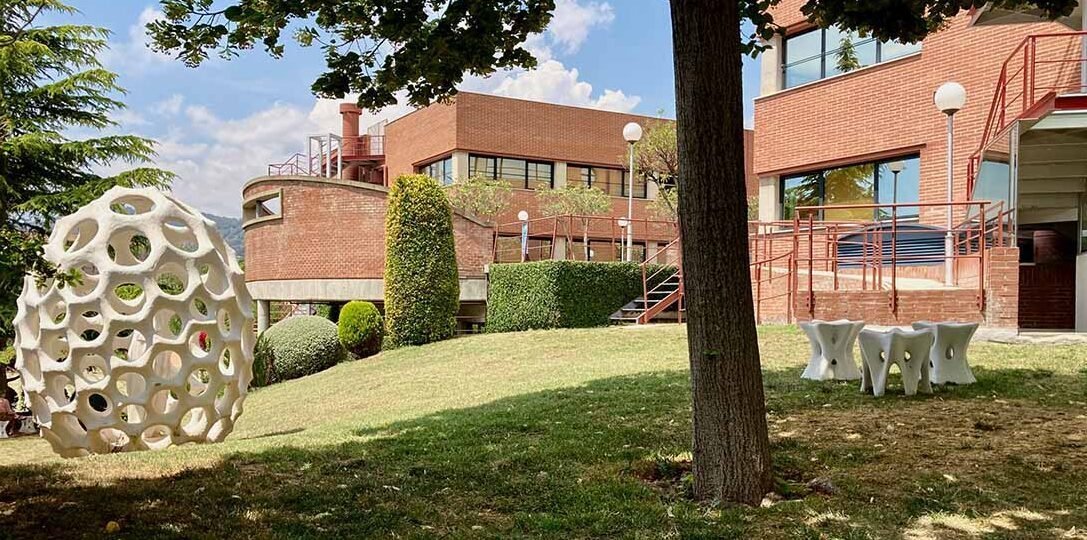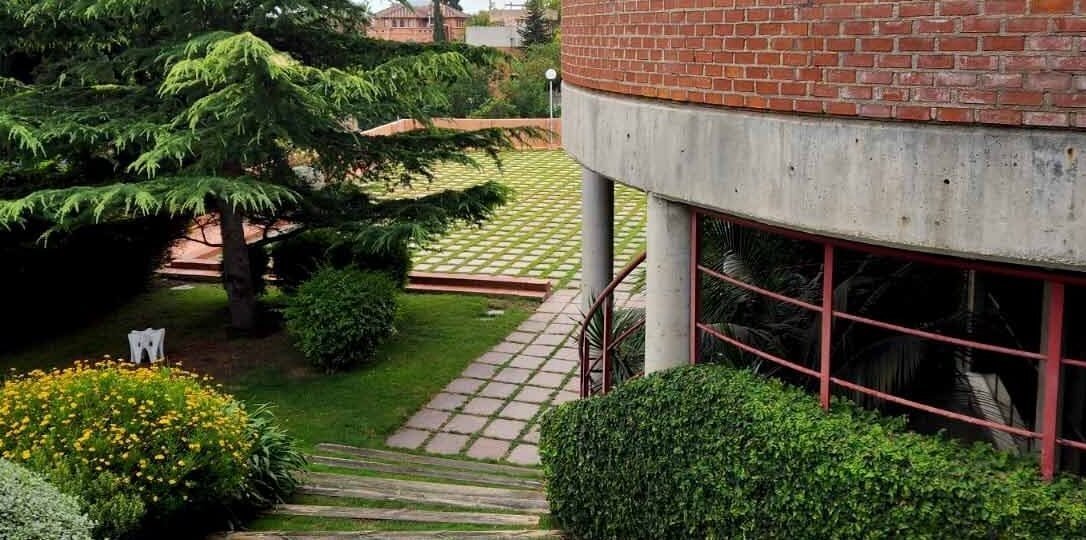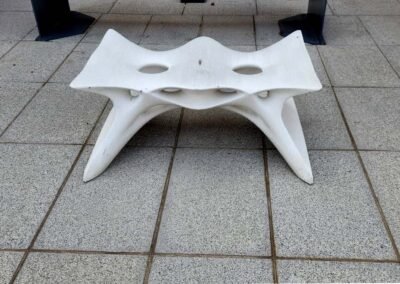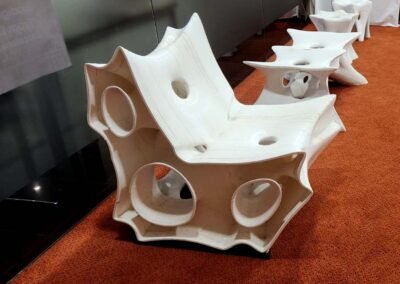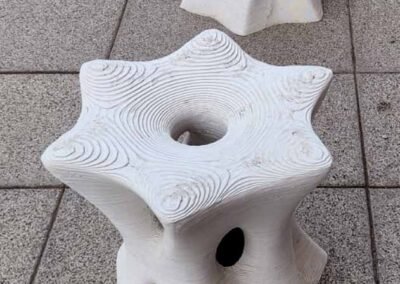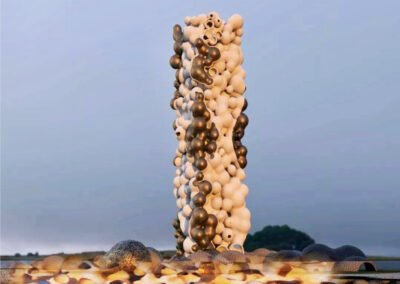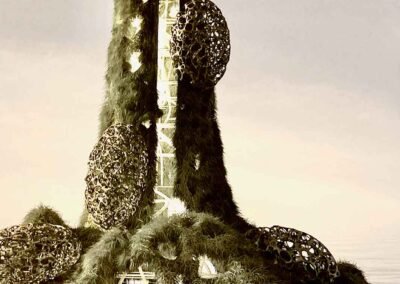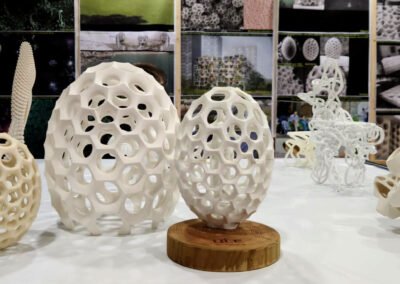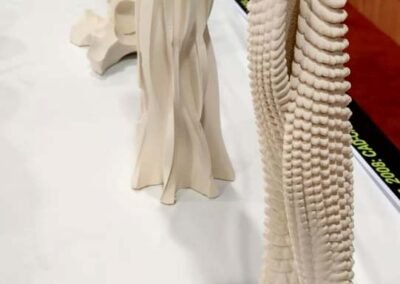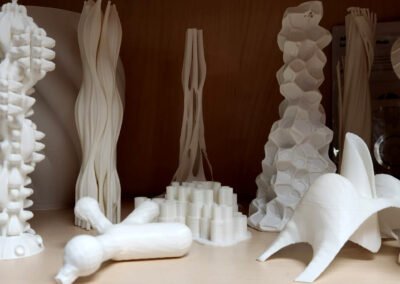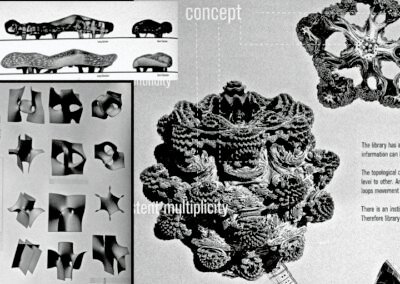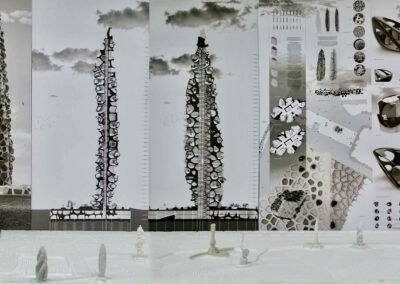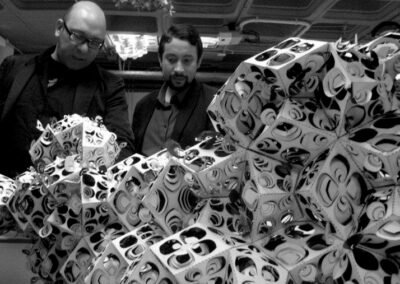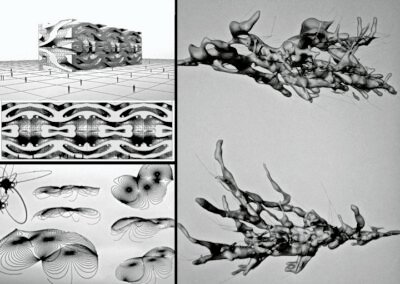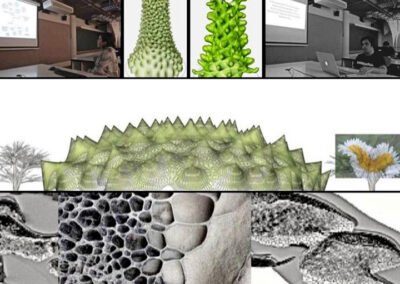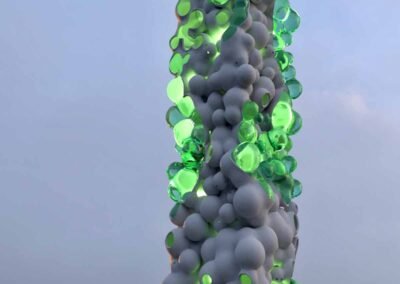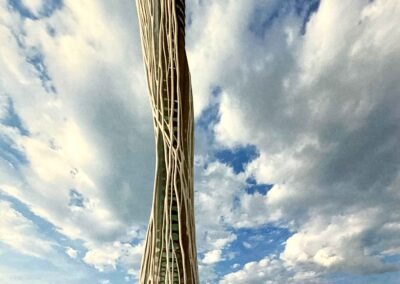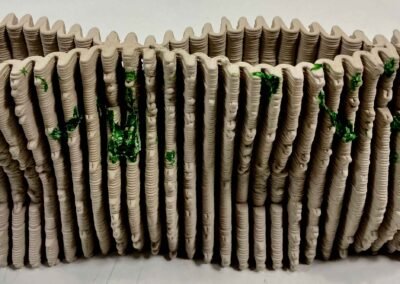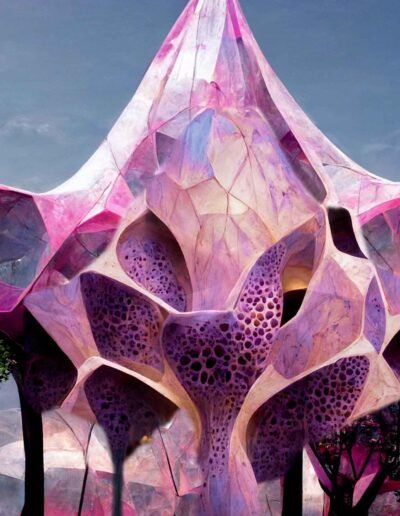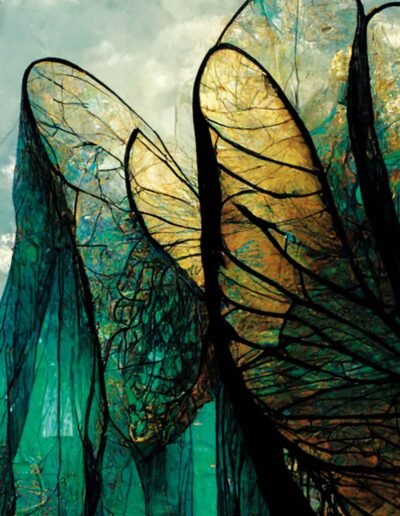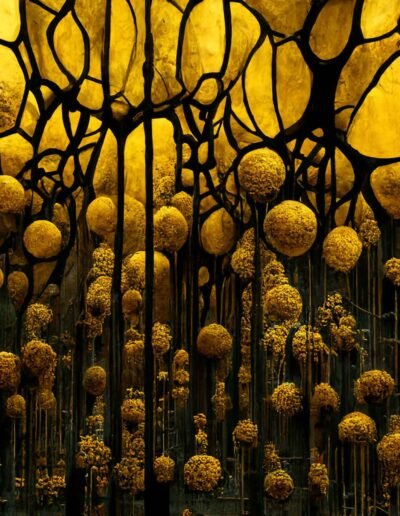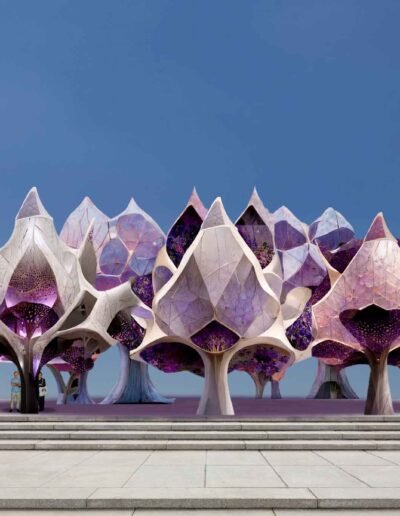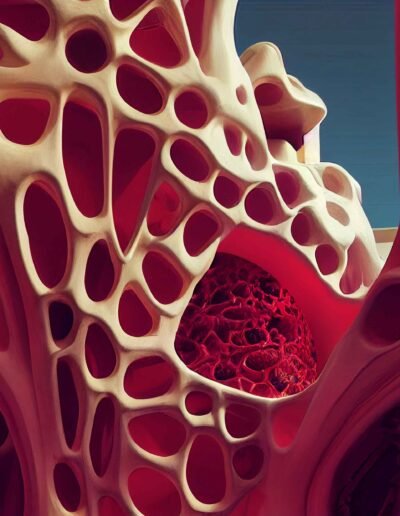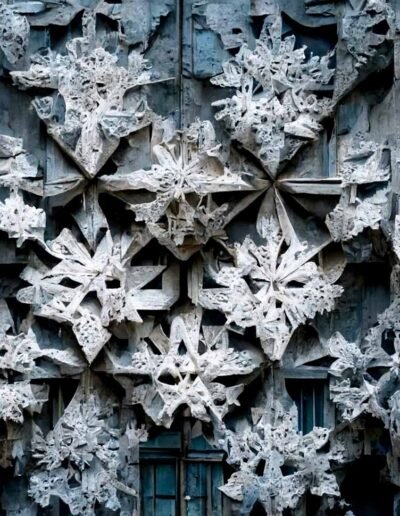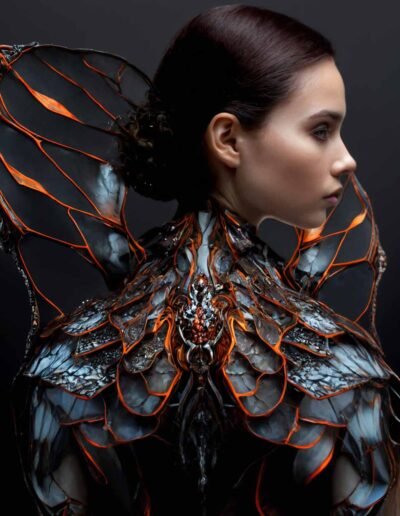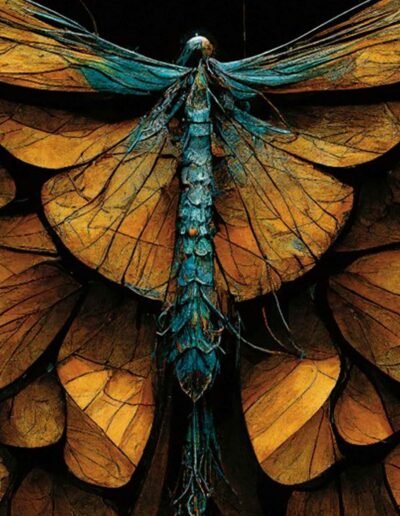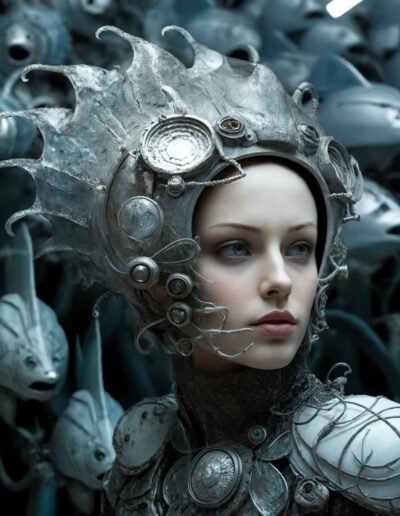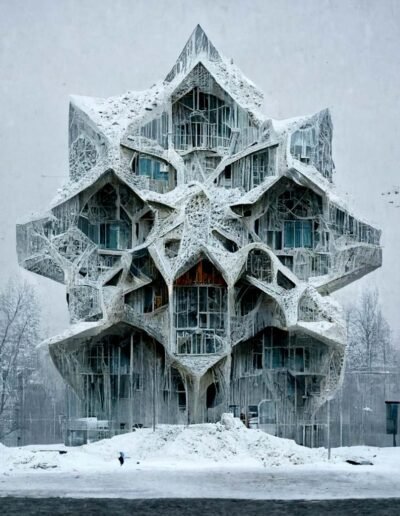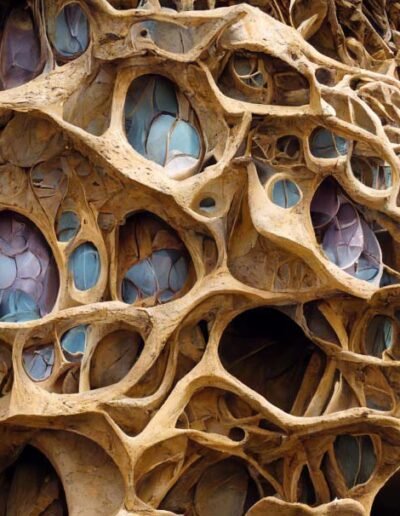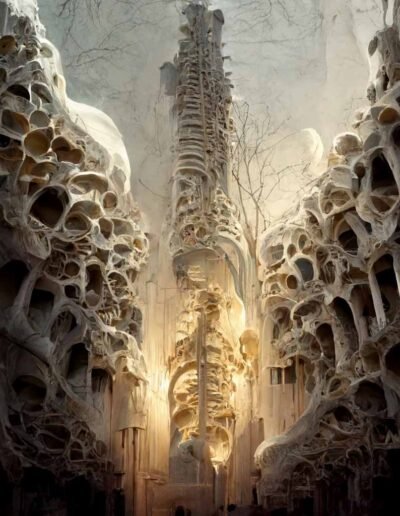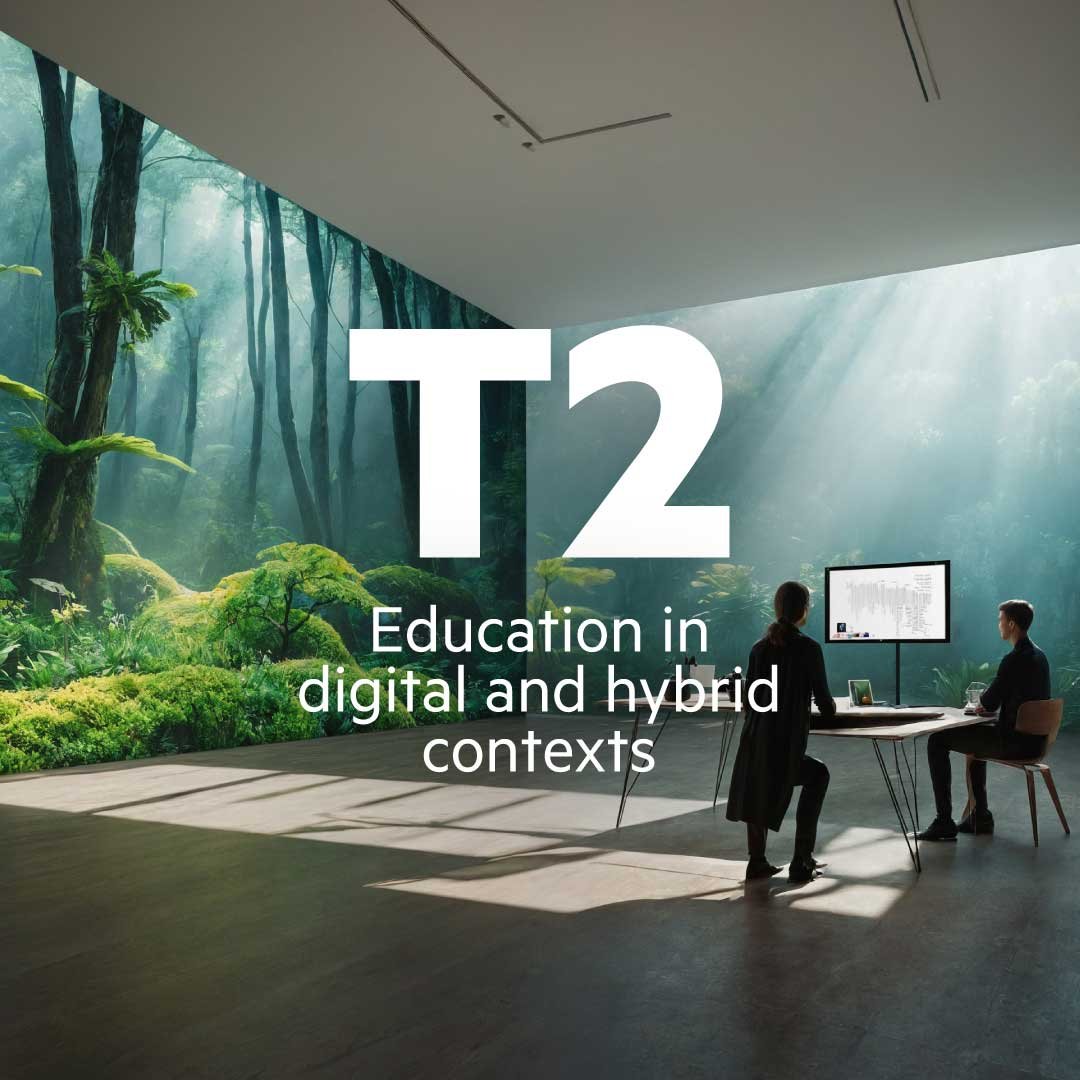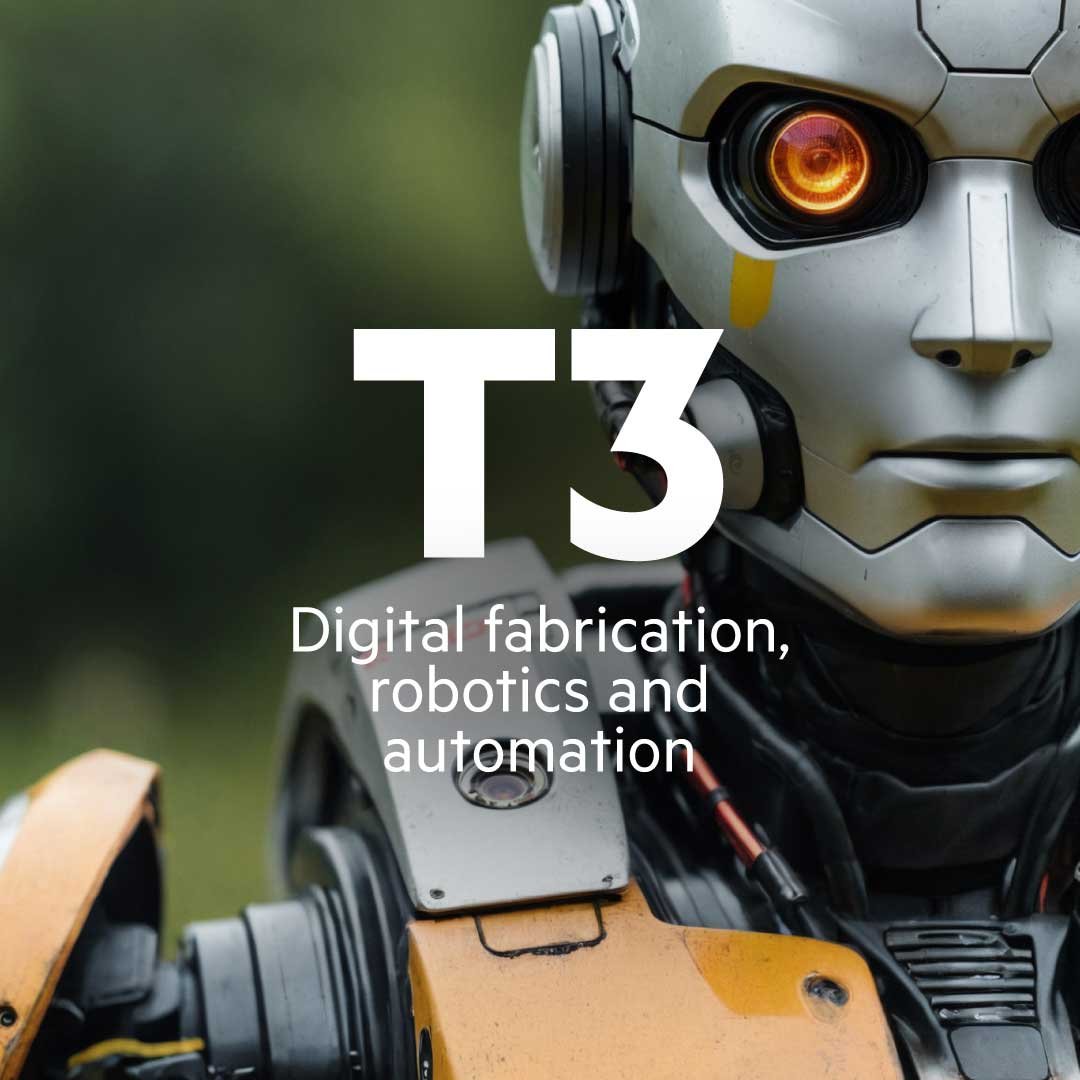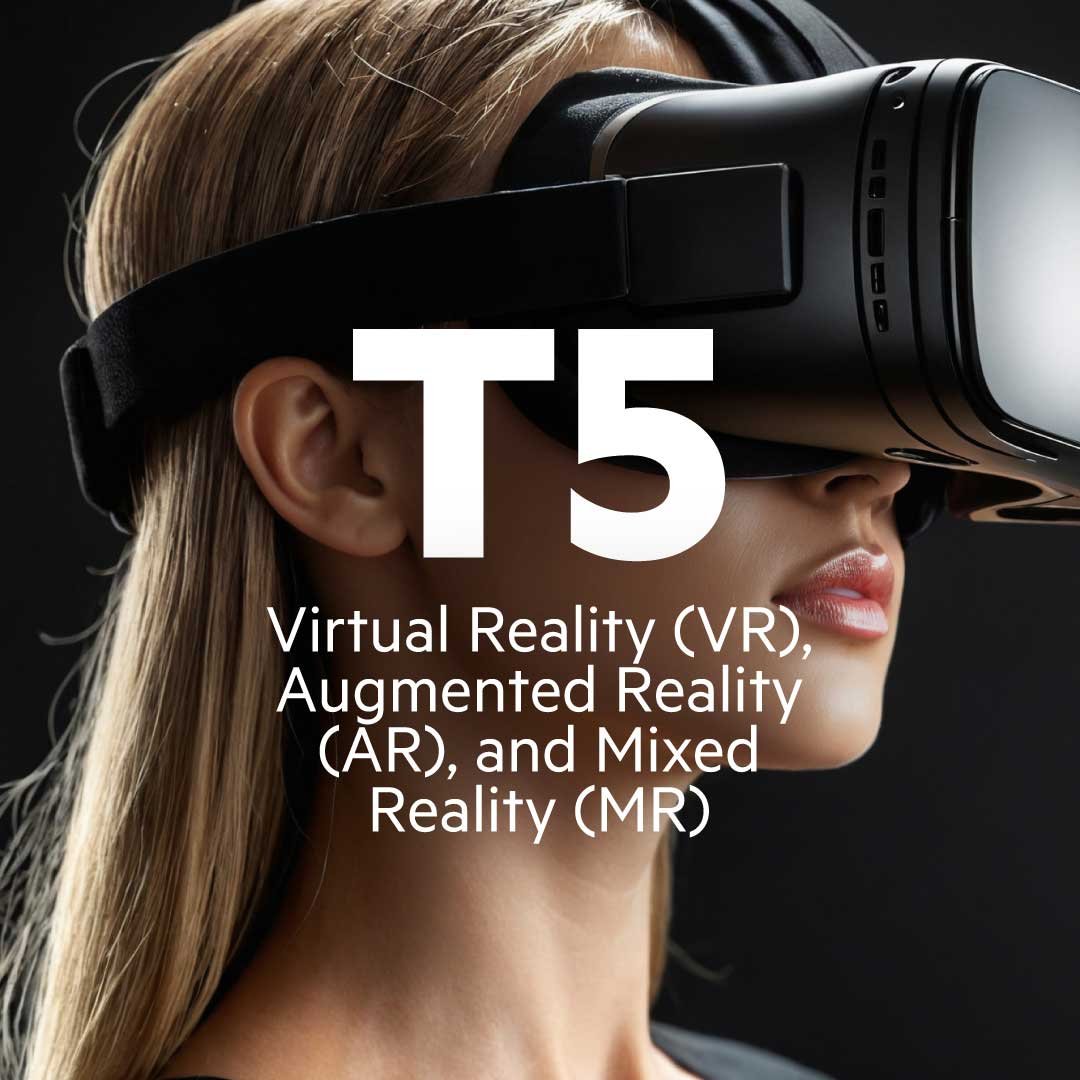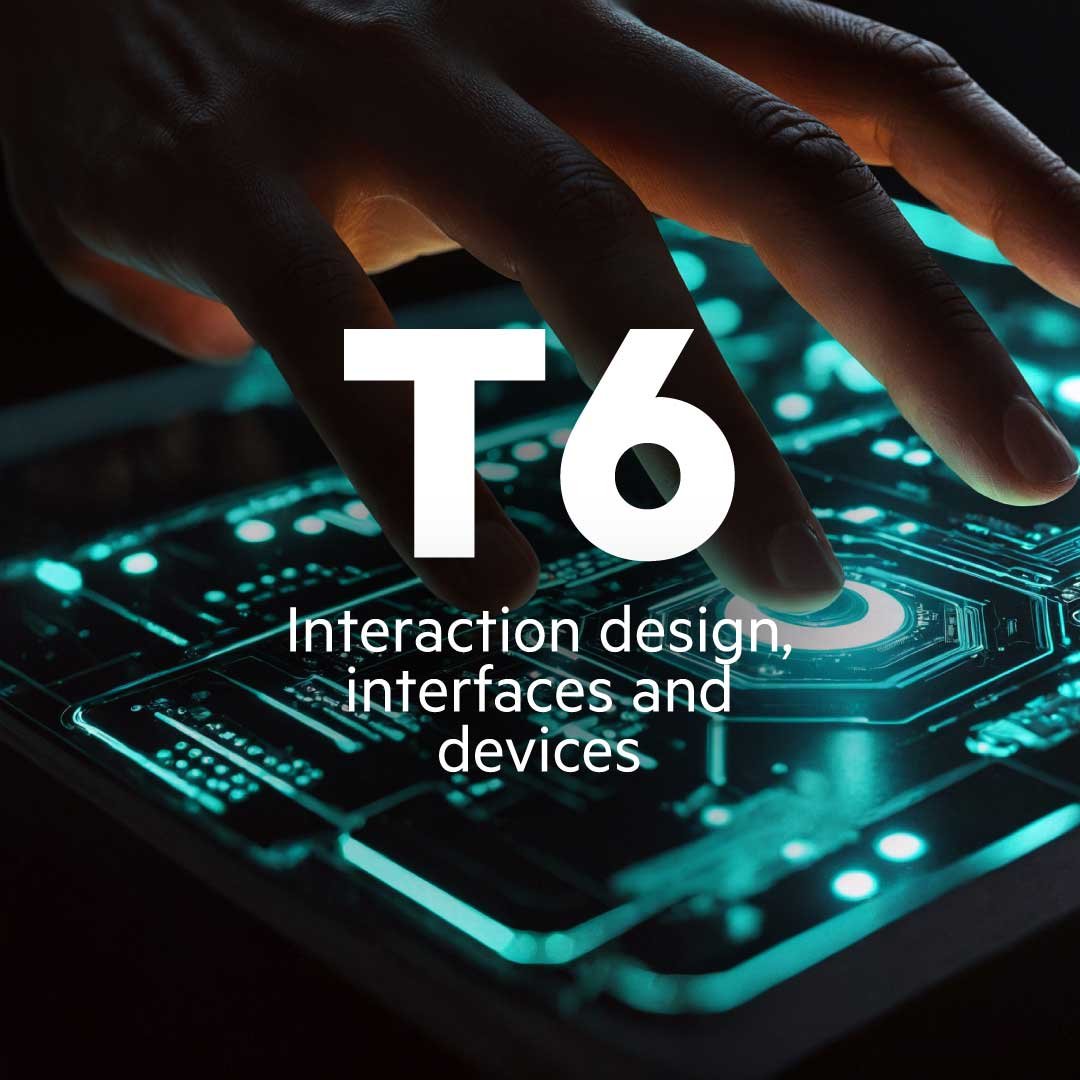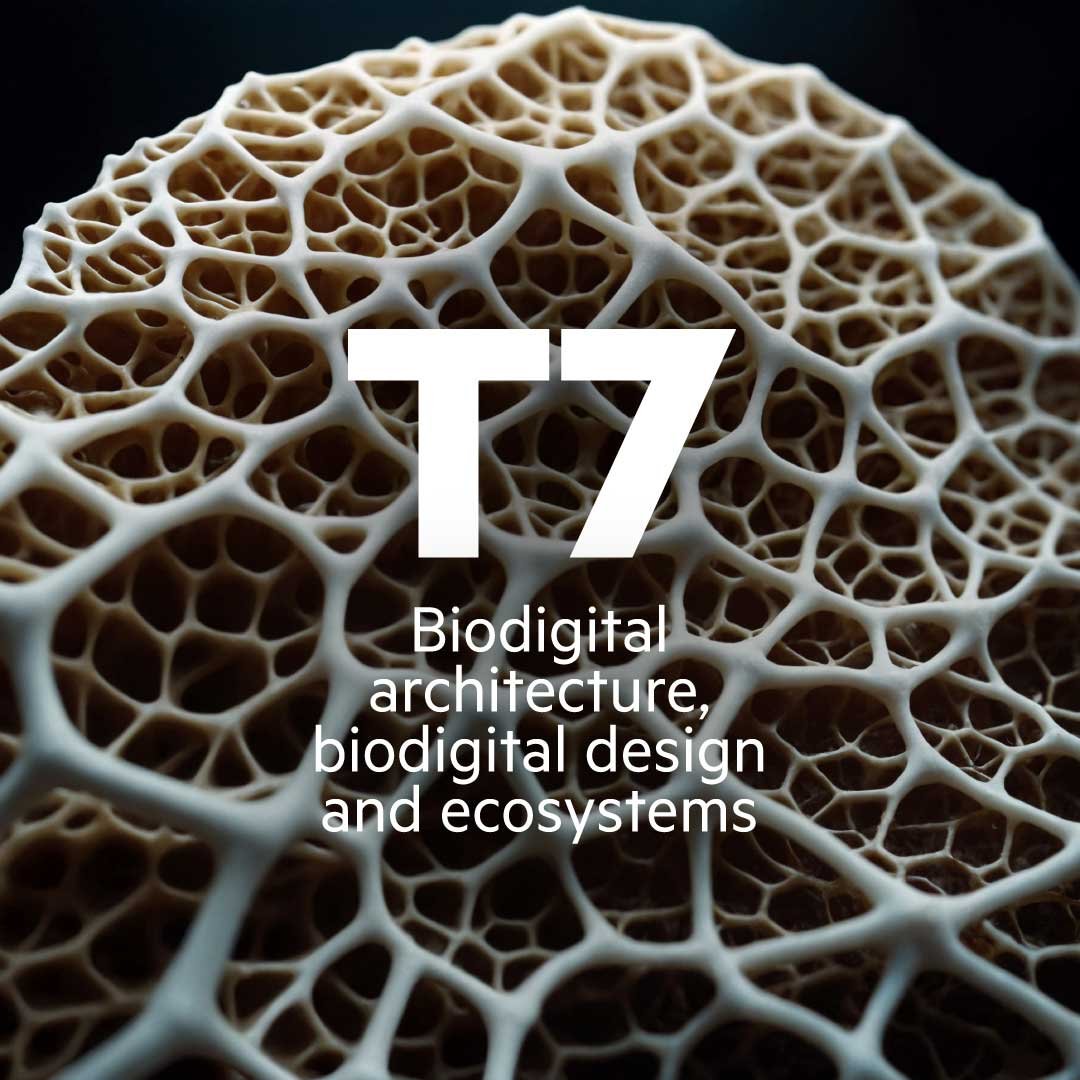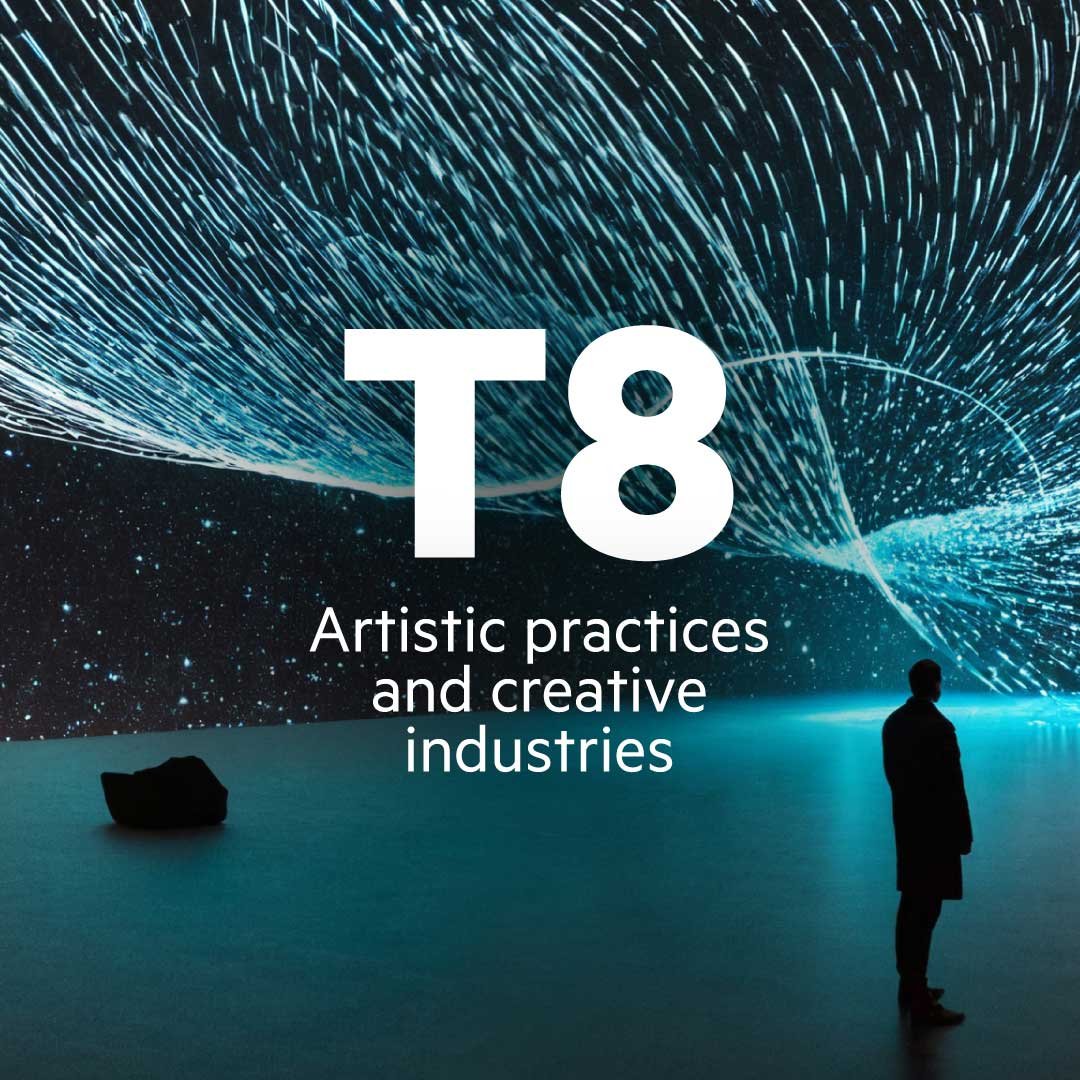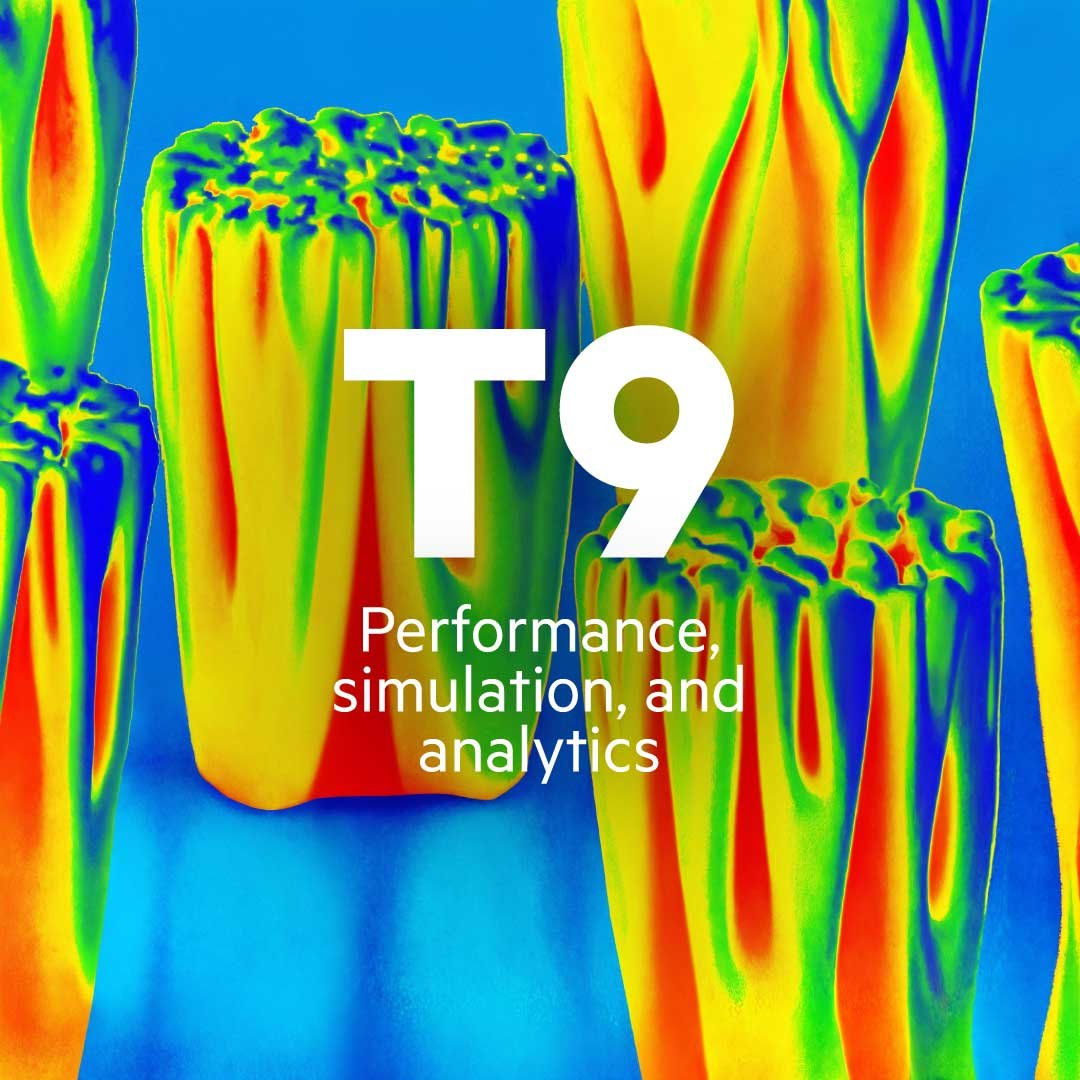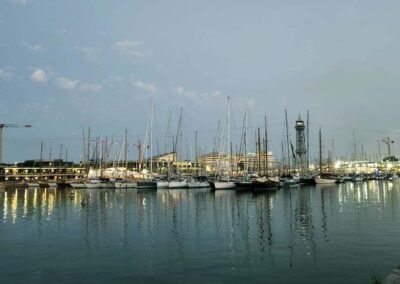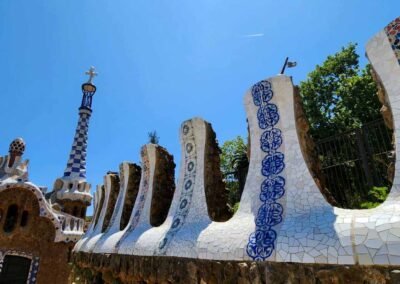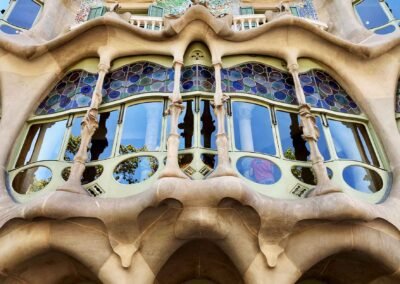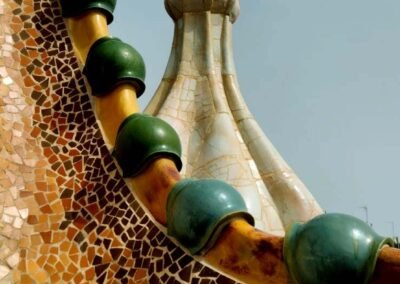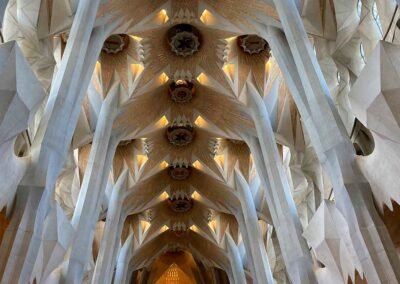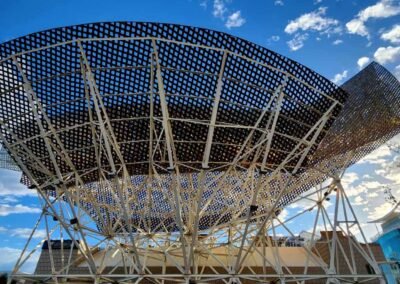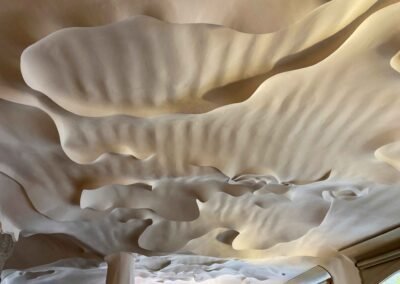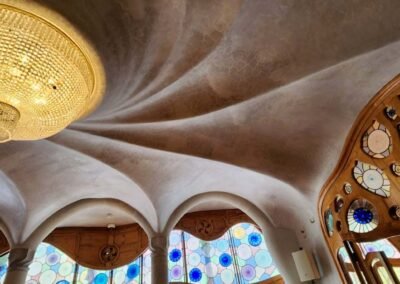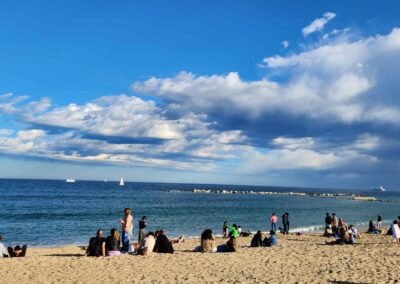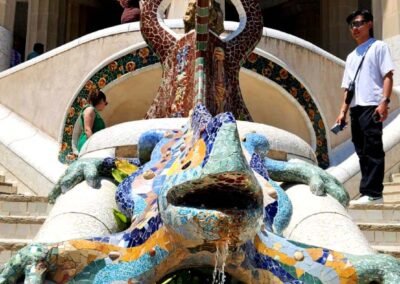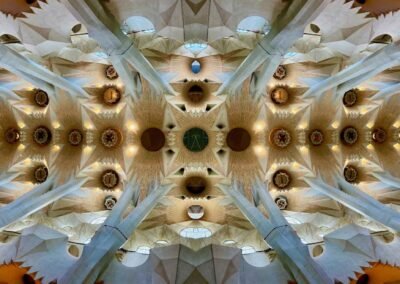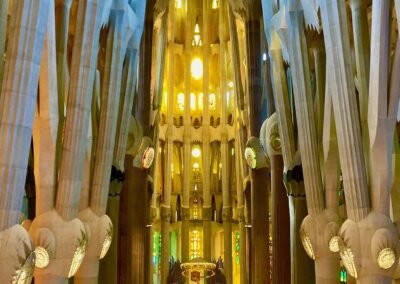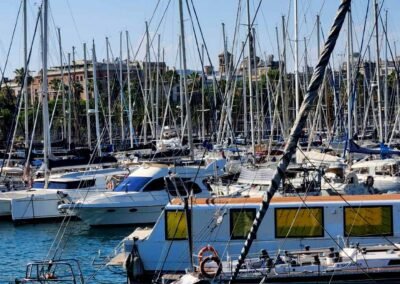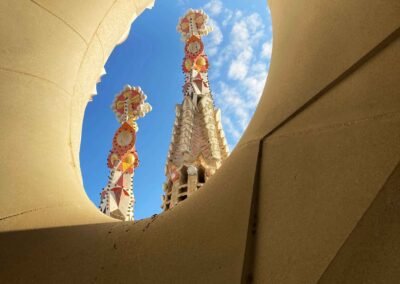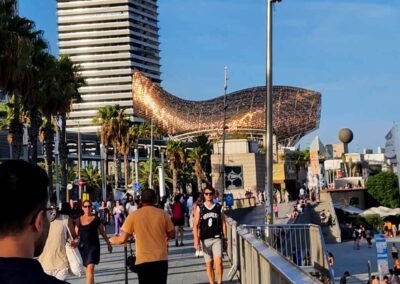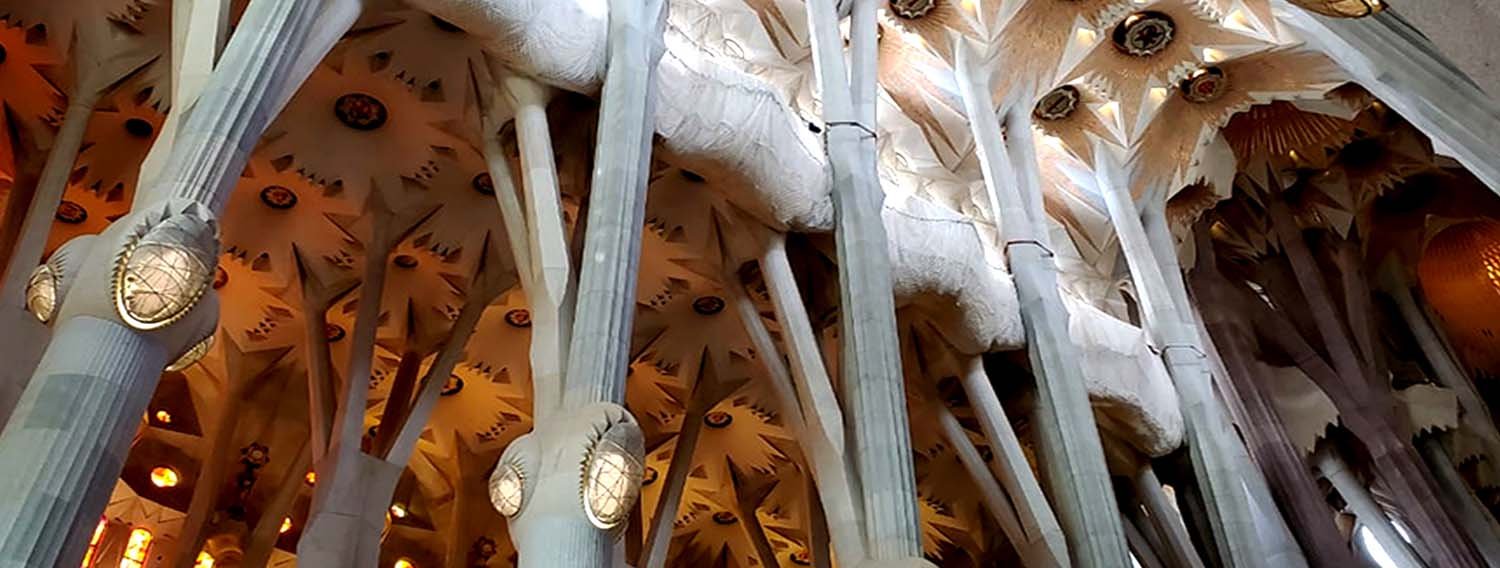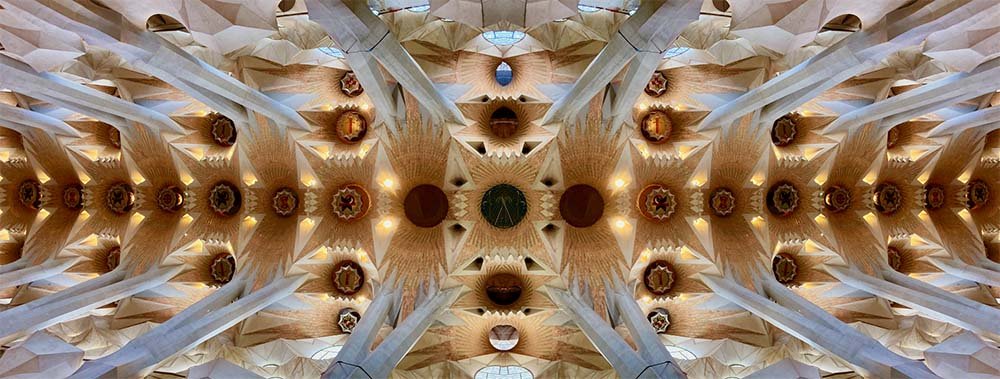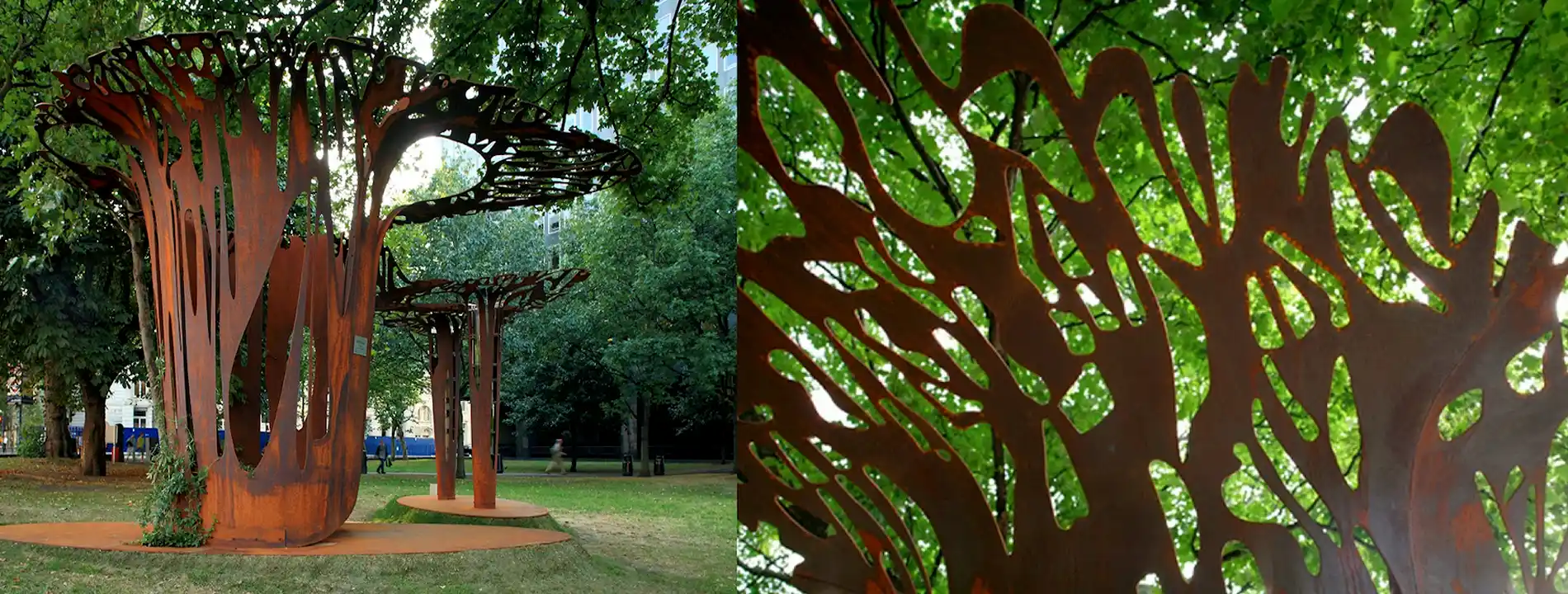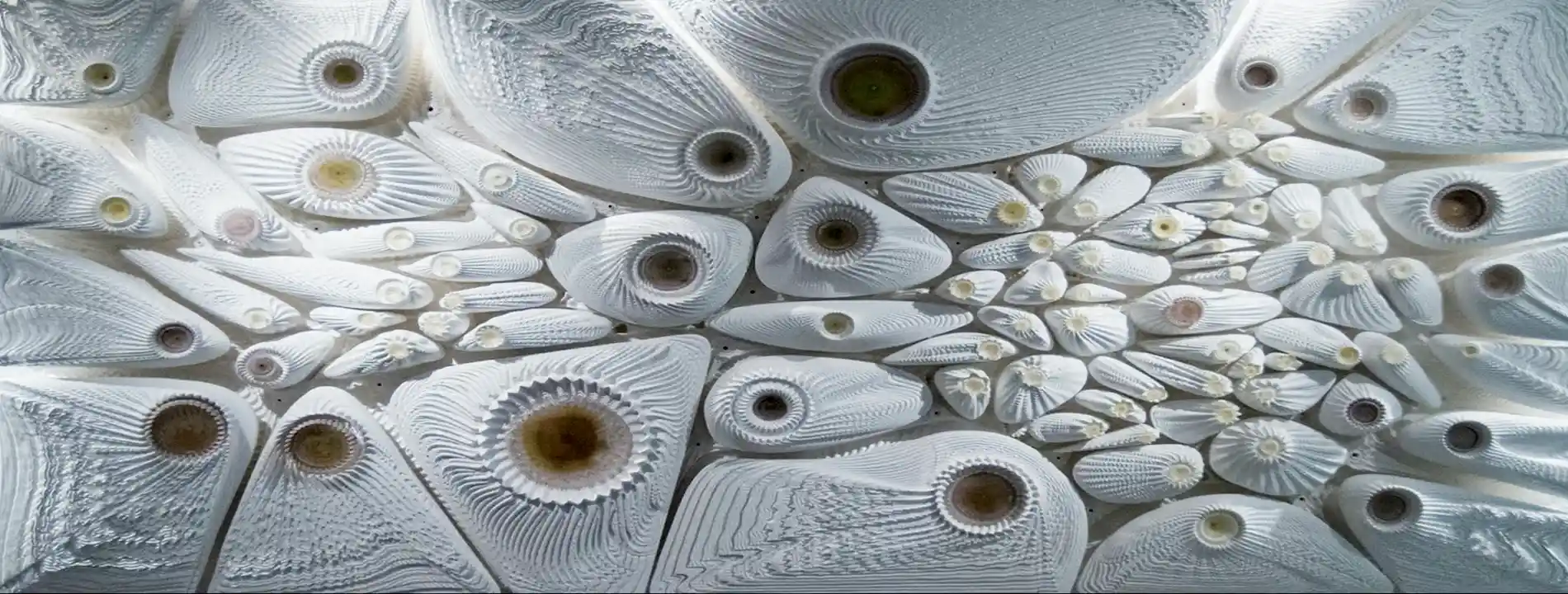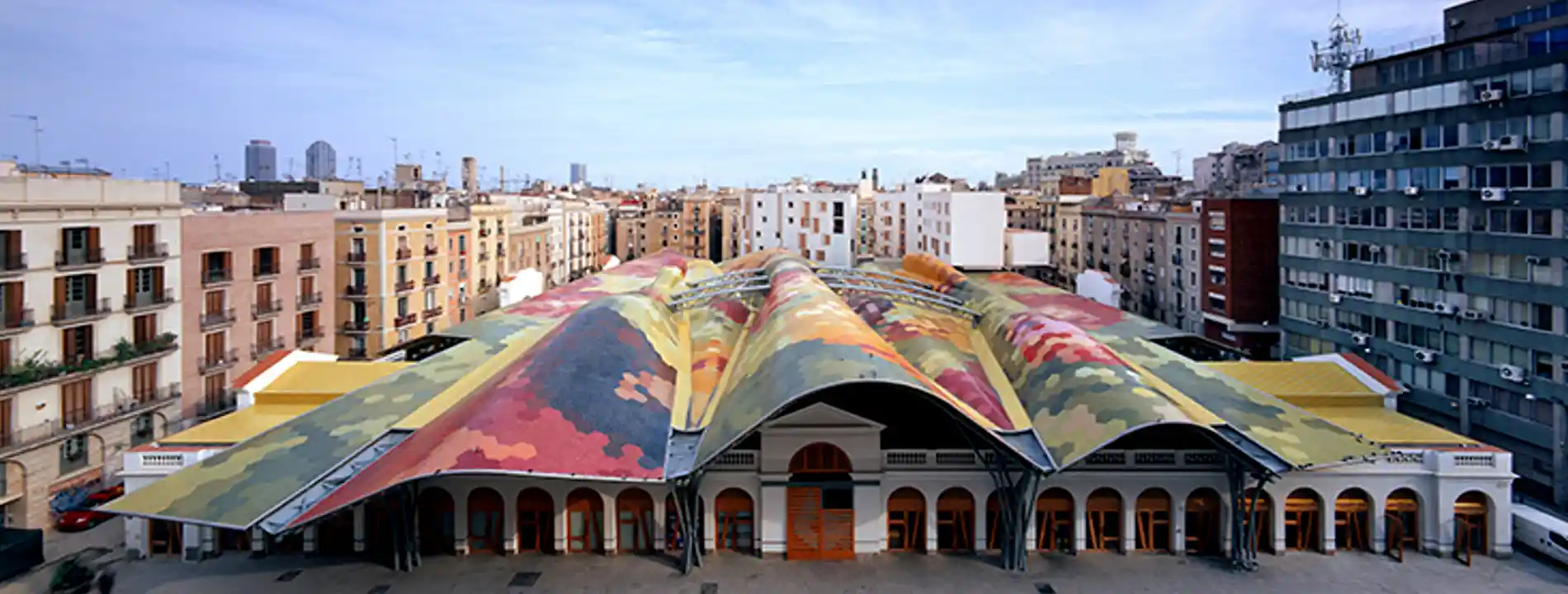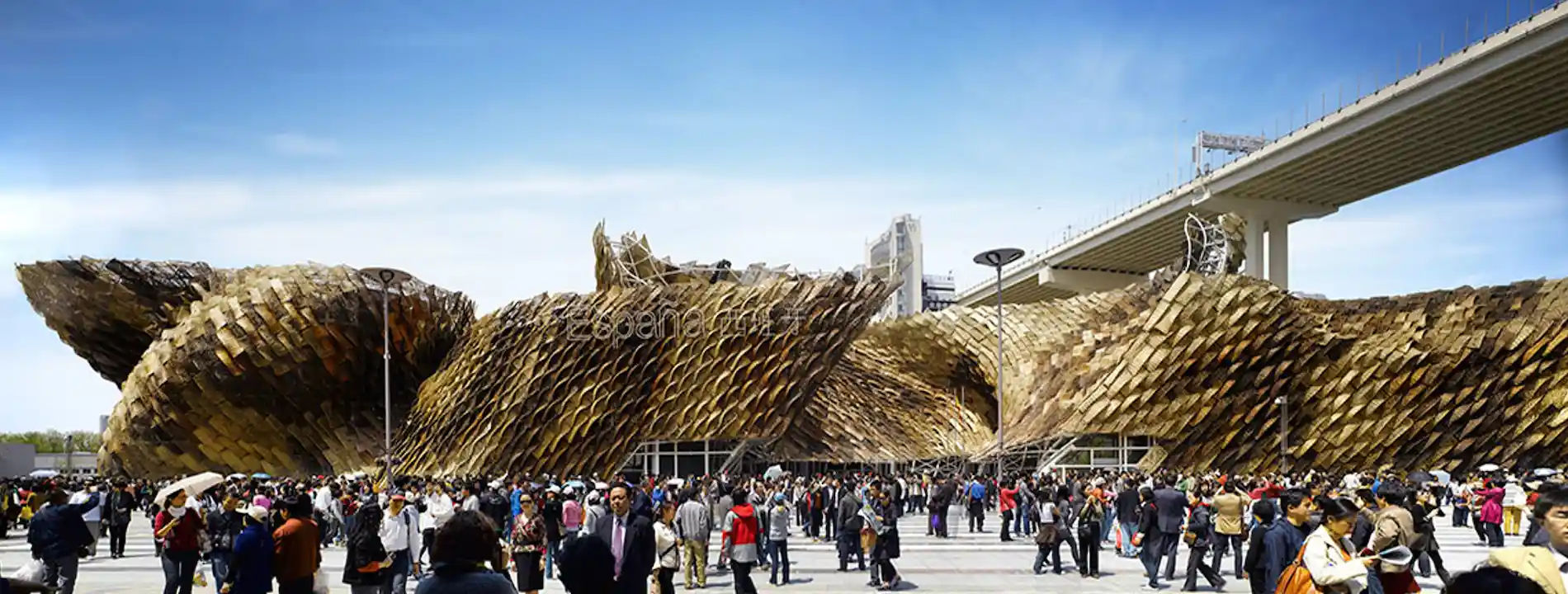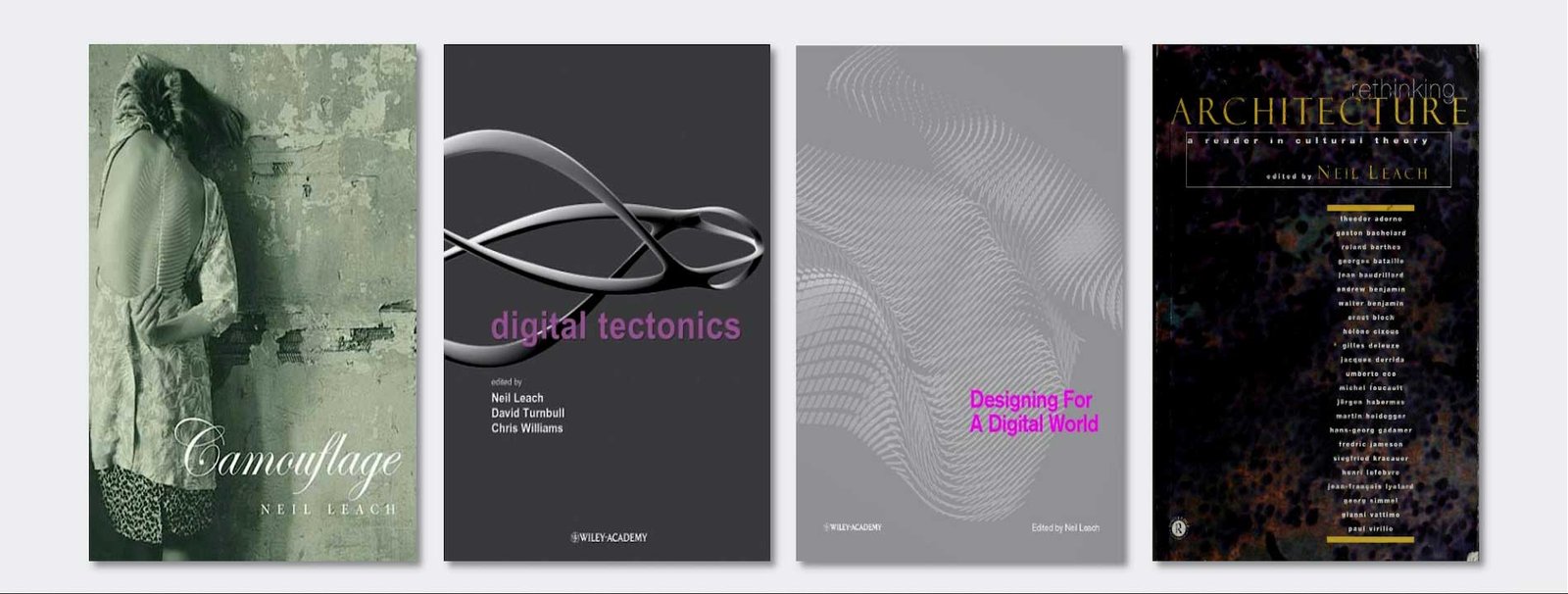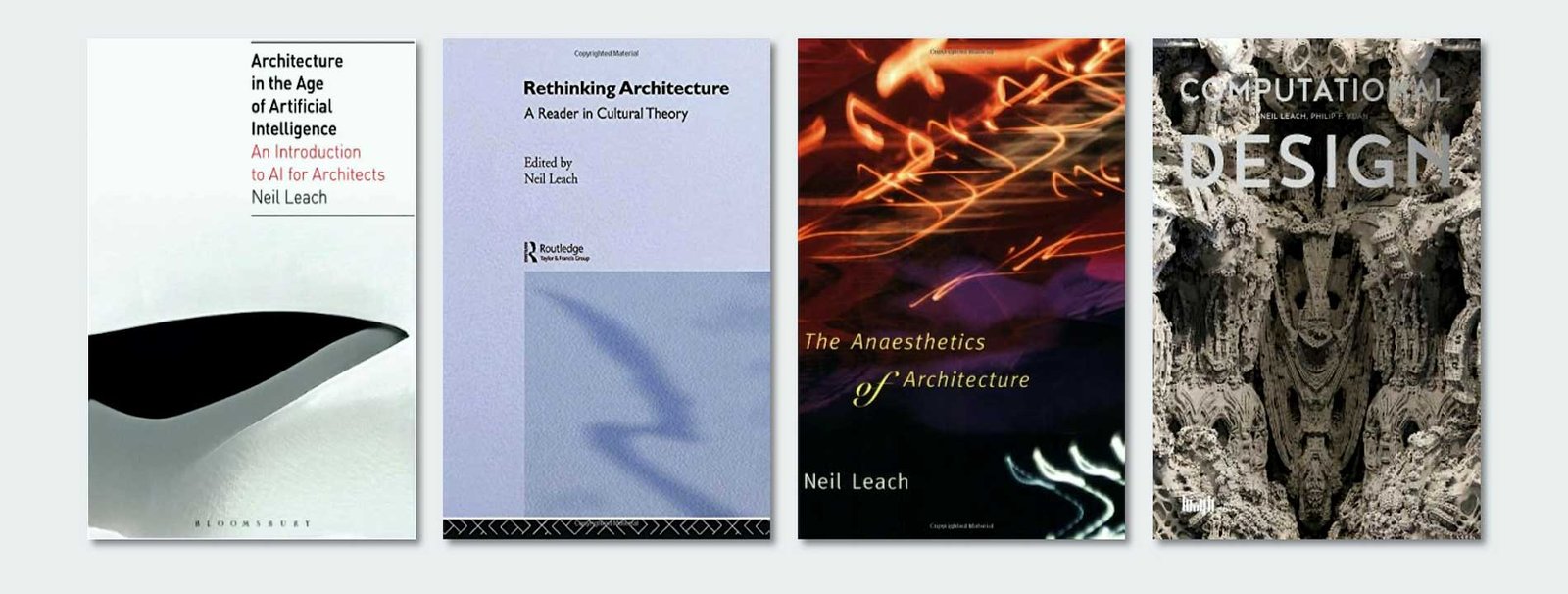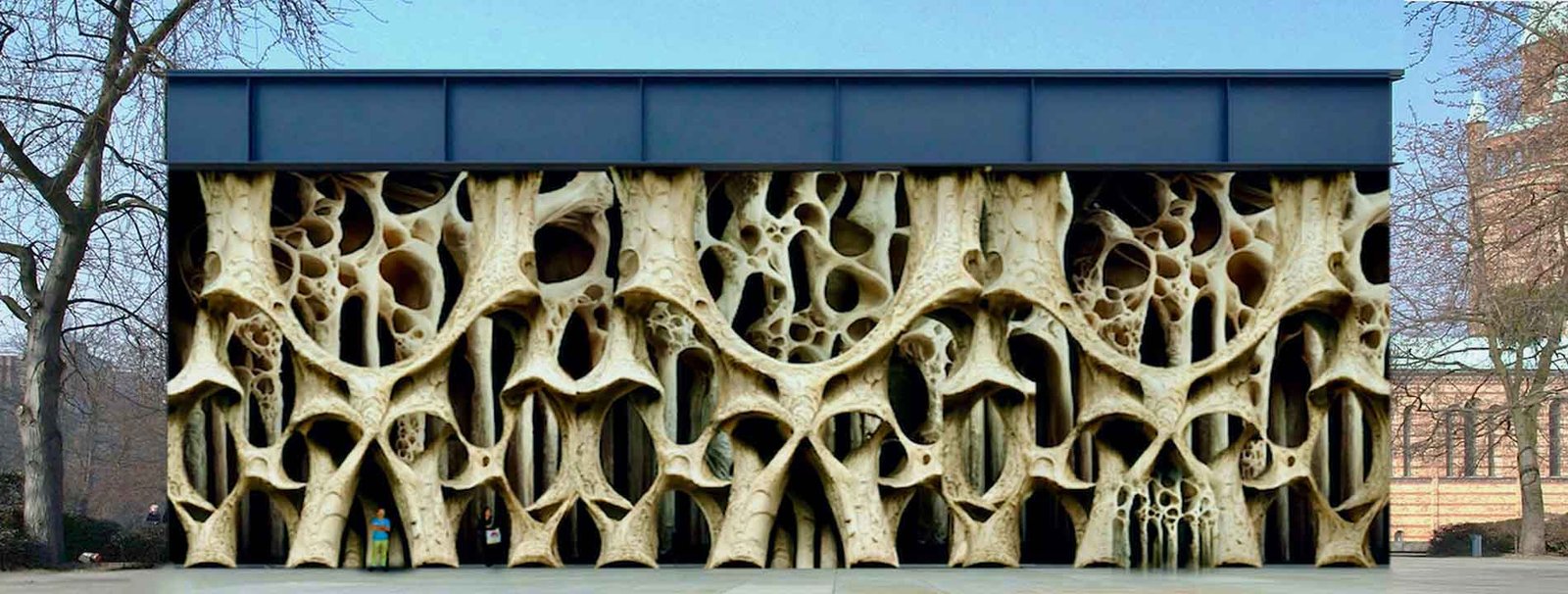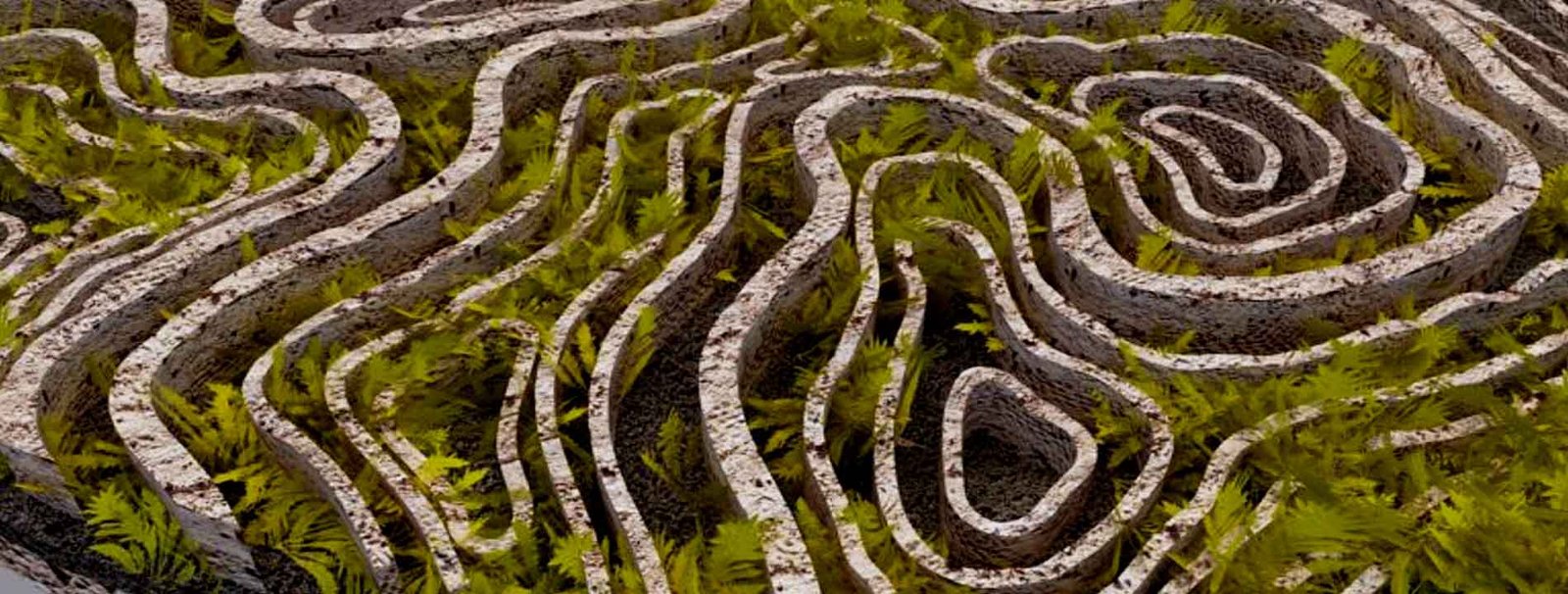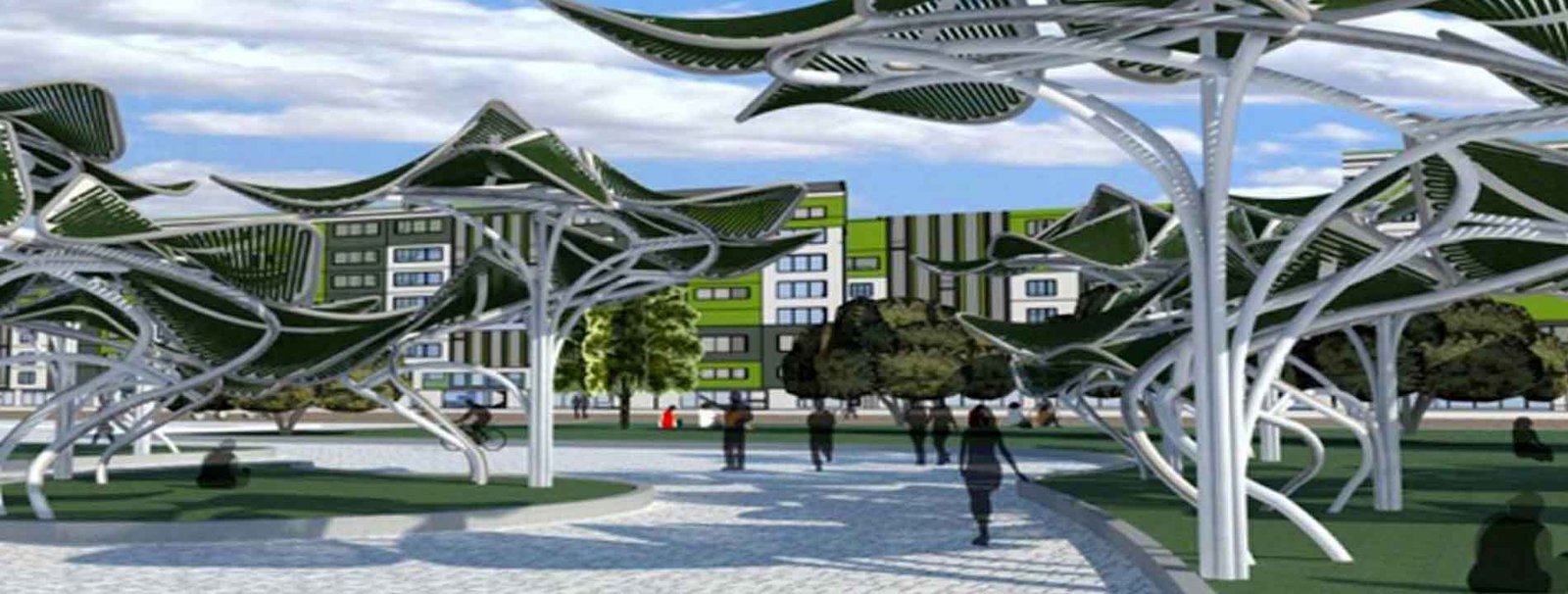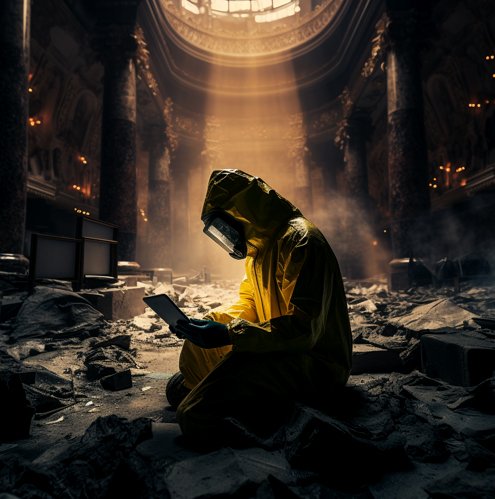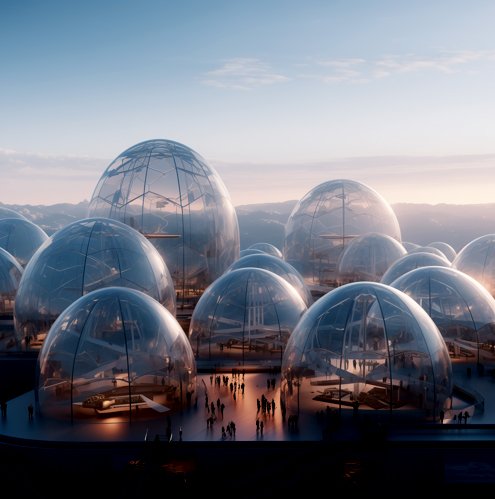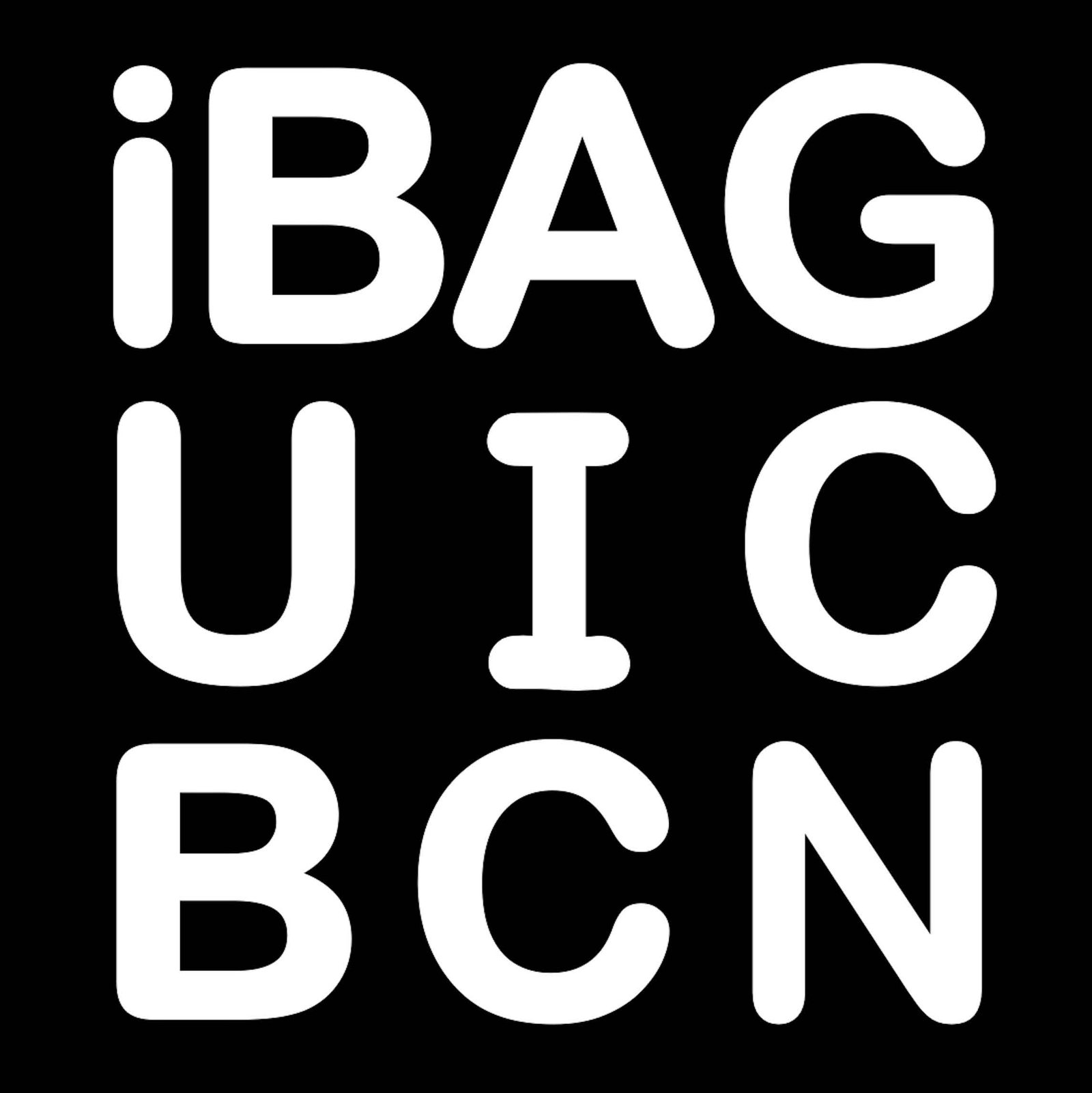Host
UIC Barcelona
innovation and development.
iNSTITUTE FOR BiODiGITAL ARCHITECTURE &
GENETICS (iBAG)
Basically, it is about applying the new biological and digital techniques to architecture and design. This led to the creation of the world’s first genetic architecture laboratory in 2000, where genetics began to be applied to architecture (bioluminescent trees, biolamps, bioprinting, electron microscopy structures research, etc.), and the first digital architecture laboratory located in a Spanish school of architecture (design and digital manufacturing). And all organizing an international interdisciplinary group of architects, designers, artists, engineers, biologists, geneticists and philosophers. New understanding from nature and computation, from natural intelligence and artificial intelligence, from bio-learning and machine-learning, to the potential of bio-manufacturing and digital-manufacturing.
iBAG images, © Alberto T. Estévez
Our team
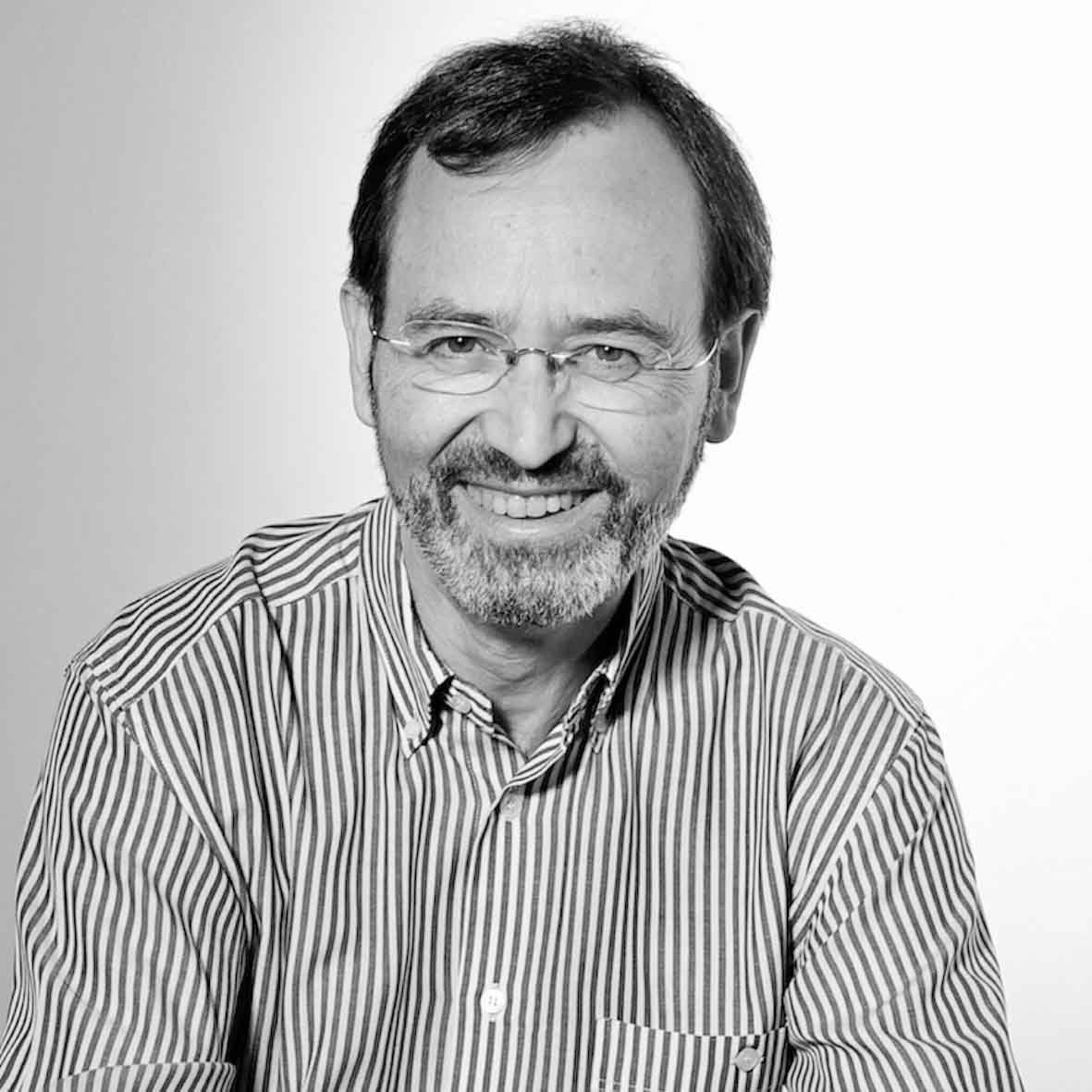
Alberto T. Estévez
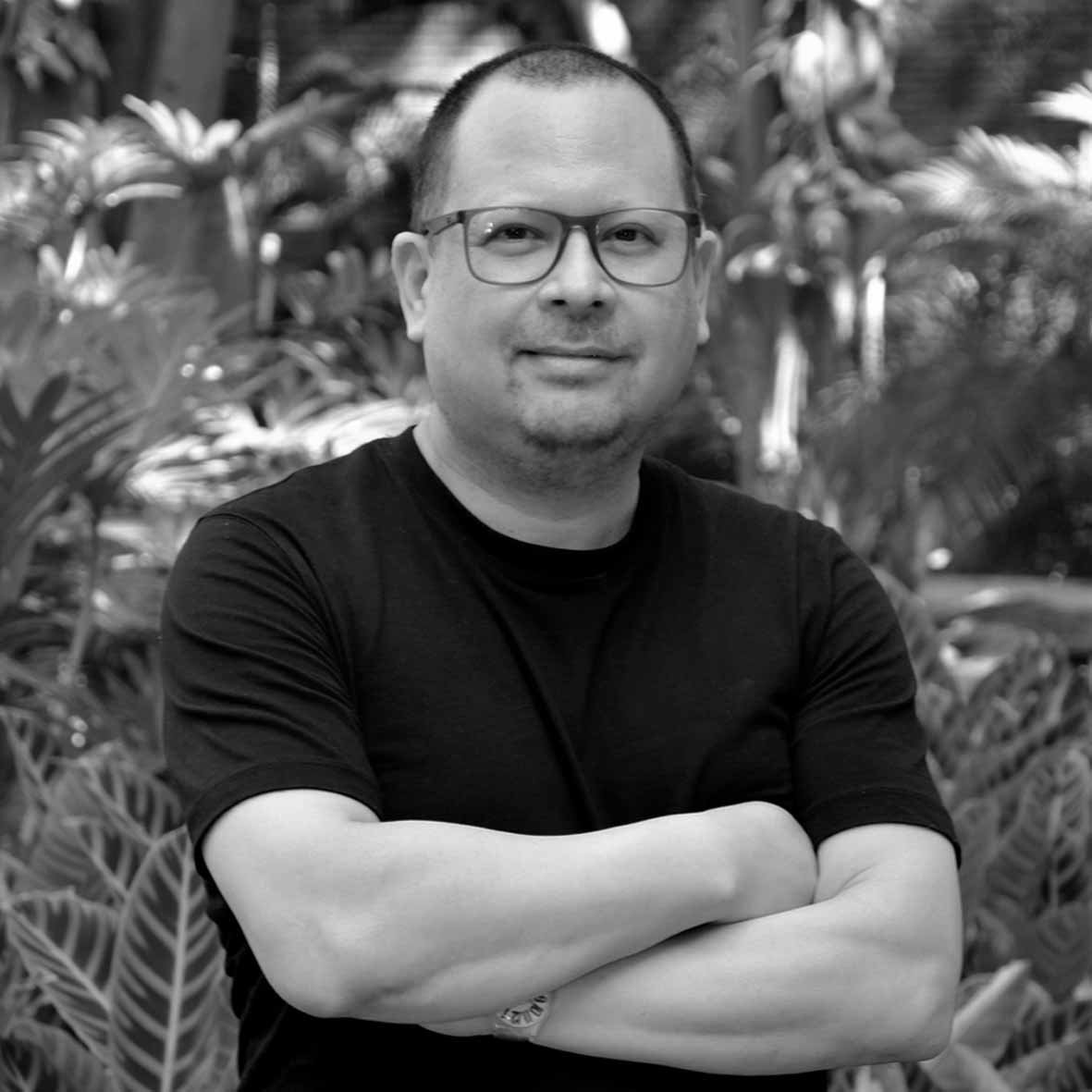
David A. Torreblanca-Díaz
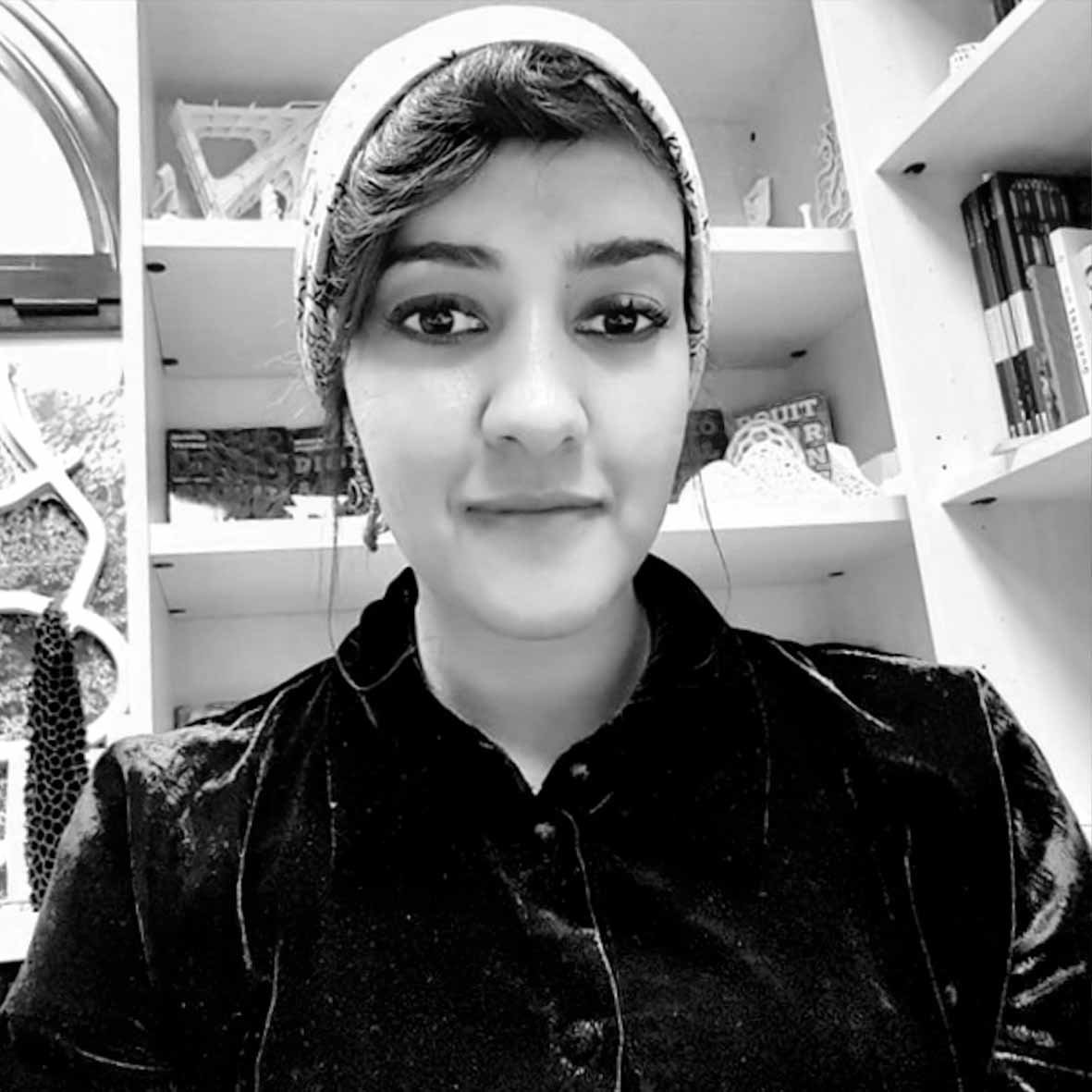
Yomna K. Abdallah
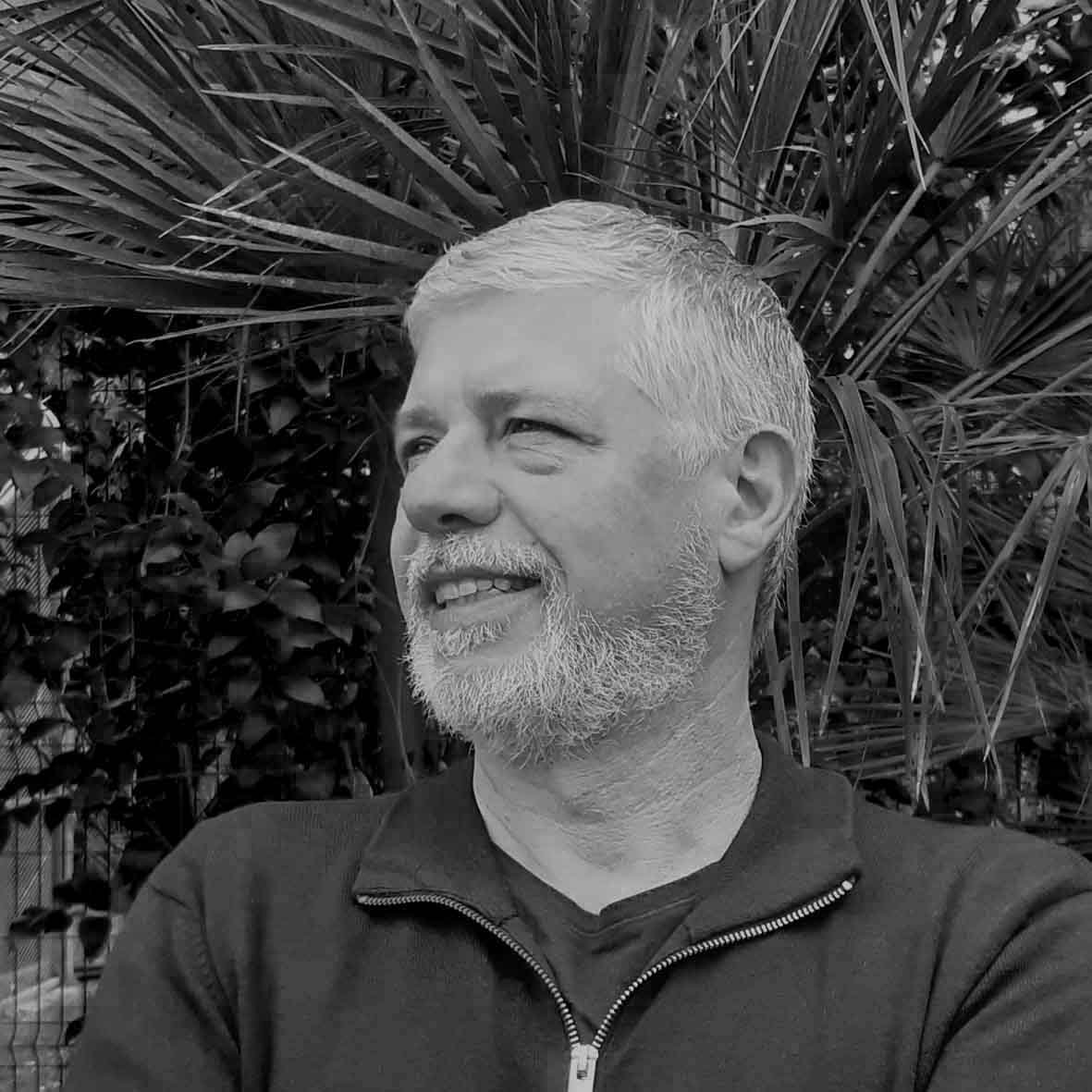
Affonso Orciuoli
- Angad Warang
- Ignasi Pérez Arnal
- Cristóbal Becker
- Frank Henderson
- Marcelo Fraile
- Natalia de Andrade
- Cemal Sönmez
Main theme
Biodigital intelligent systems
Biodigital intelligent systems refer to a confluence of principles from biology, digital technology, and artificial intelligence (AI) to create intelligent systems inspired by living organisms through a systemic approach. This field encompasses a wide range of interdisciplinary areas, including bio-inspired robotics, artificial life, evolutionary algorithms, computational neuroscience, and more. They often draw inspiration from biological structures, processes, and mechanisms, highlighting the power of biological systems and natural intelligence to create advanced and innovative technologies to adapt, learn, and solve complex problems. By emulating the principles and mechanisms observed in living organisms, these systems can exhibit remarkable capabilities such as self-organization, self-repair, robustness, and adaptability. Examples include bio-inspired robots to navigate challenging terrains, swarm robotics systems inspired by the collective behavior of social insects, neural networks based on brain, evolutionary algorithms to optimize complex tasks by mimicking natural selection and genetic variation. Finally, Biodigital Intelligent Systems are changing our world and pushing it towards a Biodigital future.
AI generated images by © Alberto T. Estévez + Yomna K. Abdallah
Tracks
Subtopics and keywords
Design theories, methodologies, and conceptual models. Digital architecture and design history. Digital strategies. Design cognition, and project communication. Hacker/maker culture, DIY, and FabLabs. Decentralized design. Decolonizing Design. Collaborative and collective design.
Subtopics and keywords
New pedagogies, strategies, and methodologies. Lifelong Learning and Digital Education. Hybrid Education. Online Learning. Collaborative and Participative Design in education.
Subtopics and keywords
Digital fabrication and Industry 4.0. Robotics. Digital craft. Integrated manufacturing systems. Emerging digital fabrication systems. Design for Manufacturing and Assembly.
Subtopics and keywords
Formal patterns. Shape grammars. Fractal geometries. Generative Design. Parametric Analysis. Machine Learning. Predictive Modeling. Building Information Modeling (BIM).
Subtopics and keywords
Virtual Reality (VR). Augmented Reality (AR). Mixed Reality (MR). Digital interfaces. Metaverse. Phygital interaction.
Subtopics and keywords
Interaction design. Human-Computer Interaction. Internet of Things (IOT). Interactive and responsive objects. Smart Cities.
Subtopics and keywords
Biologically informed disciplines (biodigital, biomimicry, bionics, biophilia, etc). Biodigital architecture, urbanism and ecosystems. Biodigital product design and fashion design. Sustainable design. Biomanufacturing and biomaterials. Artificial intelligence and biodigital intelligent systems.
Subtopics and keywords
Convergences through new technologies, architecture, design and cinema. Artistic installations and performances. Mapping. Audiovisual approaches. Artificial intelligence and media art. Video game design.
Subtopics and keywords
Performance-based design. Simulations: Finite Element Analysis (FEA), Computational Fluid Dynamics (CFD), thermal analysis, solar simulations, kinematics simulations, etc. Analytics.
Venue
Barcelona
•Ranked among the best cities to live in internationally.
•One of the world’s leading cities in innovation, business, culture, art and design.
•The chance to practice Spanish, the world’s second most-spoken language.
•Climate, cuisine, cultural activities, architecture, night-life, safety, friendliness, beach, mountains.
•Excellent scientific facilities (Barcelona Supercomputing Centre, The Alba Synchrotron, Biocat, Science and Technology Park Network…).
•Catalonia is home to 250,000 students, 15,000 lecturers, 800 research groups and 2,500 researchers.
Photos by © David A. Torreblanca-Díaz and © Alberto T. Estévez
Barcelona tourist attactions
*Important: these following links are only recommendations and are not the responsibility of the SIGraDi 2024 organizers.
Tourist attractions
Barcelona GO! – A Rob Whitworth Time-lapse
Tours de arquitectura en Barcelona
https://www.artchitectours.es/tour/tours-de-arquitectura-en-barcelona-sigradi-2024/
City Tour Barcelona
Link Barcelona city tour website
La Sagrada Familia
Casa Batlló
La Pedrera-Casa Milà
Park Güell
Museo Picasso
https://museupicassobcn.cat/es
Palau de la música
Catedral de Barcelona
Fundación Mies Van Der Rohe
https://miesbcn.com/the-pavilion/
Centro de Cultura Contemporánea de Barcelona
Museo de Ciencias Naturales de Barcelona
Museo de Arte Contemporáneo de Barcelona
Montaña de Montjuïc
https://www.telefericdemontjuic.cat/es/que-ver-en-montjuic
Montserrat
Caixa Forum
Visas information
Spain Visa Information
Josep Tarradellas Barcelona-El Prat airport
https://www.aena.es/en/josep-tarradellas-barcelona-el-prat.html
About UIC
Universitat Internacional de Catalunya -UIC- / Google Map Link
Sarrià train station / Station near to UIC, around 15 minutes walking
Schedule
November 4 – 8th
Online Workshops
November 13 -15 th
In person conference
Wednesday 13th
Research in the Biodigital Era / Natural & Artificial Intelligence
09:00 OPENING CEREMONY and WELCOME SPEECHES
10:00 KEYNOTE SPEAKER: Jordi Faulí, Gaudí Sagrada Familia Architect Director
11:30 COFFEE BREAK – Garden
12:00 PAPERS PRESENTATIONS in 4 simultaneous rooms
14:30 LUNCH TIME – Garden
15:30 PAPERS PRESENTATIONS in 4 simultaneous rooms
18:00 ROUND TABLE 1: Research in Biodigital Era / Natural & Artificial Intelligence.
Moderator and speaker: Neil Leach, Professor, Curator and Writer
19:30 WELCOME SOCIAL EVENT
THURSDAY 14th
Teaching in the Biodigital Era / Biological World (& Digital Intersections)
09:00 MUSIC CONCERT & AI VIDEOS
10:00 KEYNOTE SPEAKER: Marcos Cruz, Bartlett School of Architecture
11:30 COFFEE BREAK – Garden
12:00 PAPERS PRESENTATIONS in 4 simultaneous rooms
14:30 LUNCH TIME – Garden
15:30 PAPERS PRESENTATIONS in 4 simultaneous rooms
18:00 ROUND TABLE 2: Teaching in the Biodigital Era / Biological World (& Digital Intersections).
Moderator and speaker: Yomna K. Abdallah, iBAG-UIC Barcelona
20:00 GALA DINNER in restaurant “El Asador de Aranda”
FRIDAY 15th
Practice in the Biodigital Era / Digital World (& Biological Intersections)
09:00 MUSIC CONCERT & AI VIDEOS
10:00 KEYNOTE SPEAKER: Benedetta Tagliabue, EMBT Architects
11:30 COFFEE BREAK – Garden
12:00 PAPERS PRESENTATIONS in 4 simultaneous rooms
14:30 LUNCH TIME – Garden
15:30 PAPERS PRESENTATIONS in 4 simultaneous rooms
18:00 ROUND TABLE 3: Practice in the Biodigital Era / Digital World (& Biological Intersections).
Moderator and speaker: Rosa Cervera, Sustainable & Bionic Architecture
19:30 CLOSING CEREMONY.
SIGraDi Annual General Meeting / Awards / Workshops presentations / CAAD Conferences presentations / SIGraDi 2025 Launching
Keynotes
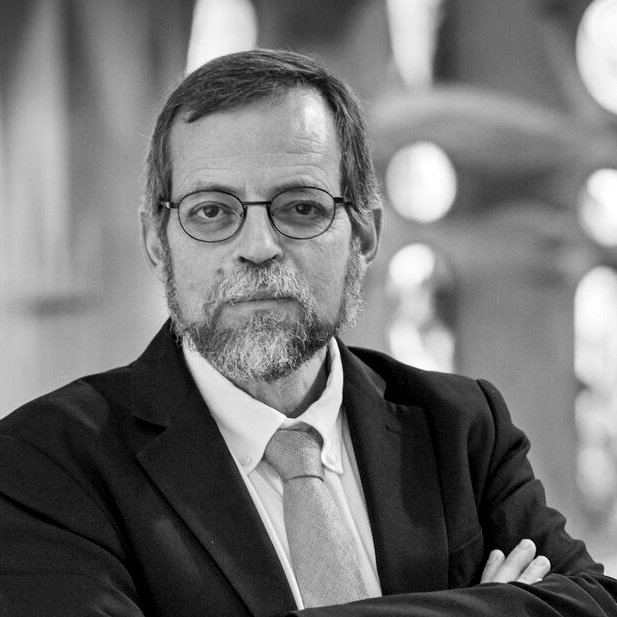
Jordi Faulí
Jordi Faulí, is an architect and, since 2012, he is the current directing architect of the Sagrada Familia Basilica. In 1990 he joined the works of the temple within the team directed at that time by Jordi Bonet, and collaborated in the structural analysis of this Gaudinian church, incorporating new technologies (CAD, computer simulation, 3D images) to prepare a virtual plan of the temple that would allow the project developed by Gaudí to be recreated down to the last detail and carried out.
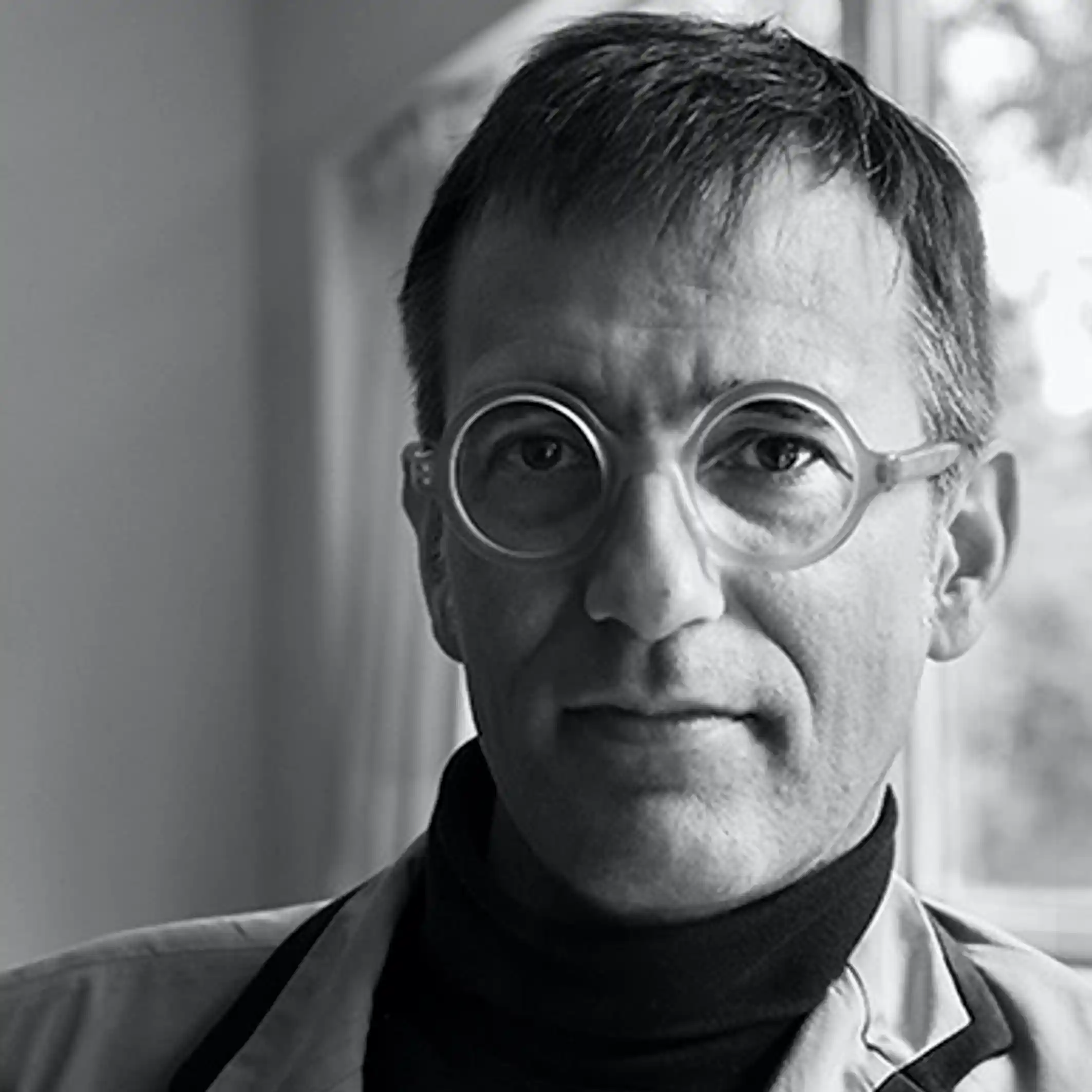
Marcos Cruz
Marcos Cruz, is an architect and professor of Innovative Environments at the Bartlett, UCL. His main research focuses on bio-integrated design in buildings. He runs Bio-ID with Dr. Brenda Parker, a multidisciplinary research platform and Masters programme that investigates design that is driven by advances in bio-technology, computation, materials and fabrication. He was co-editor of Syn.de.Bio and founder of the BiotA Lab (2014-18). Cruz was the Director of the Bartlett from 2010-14.
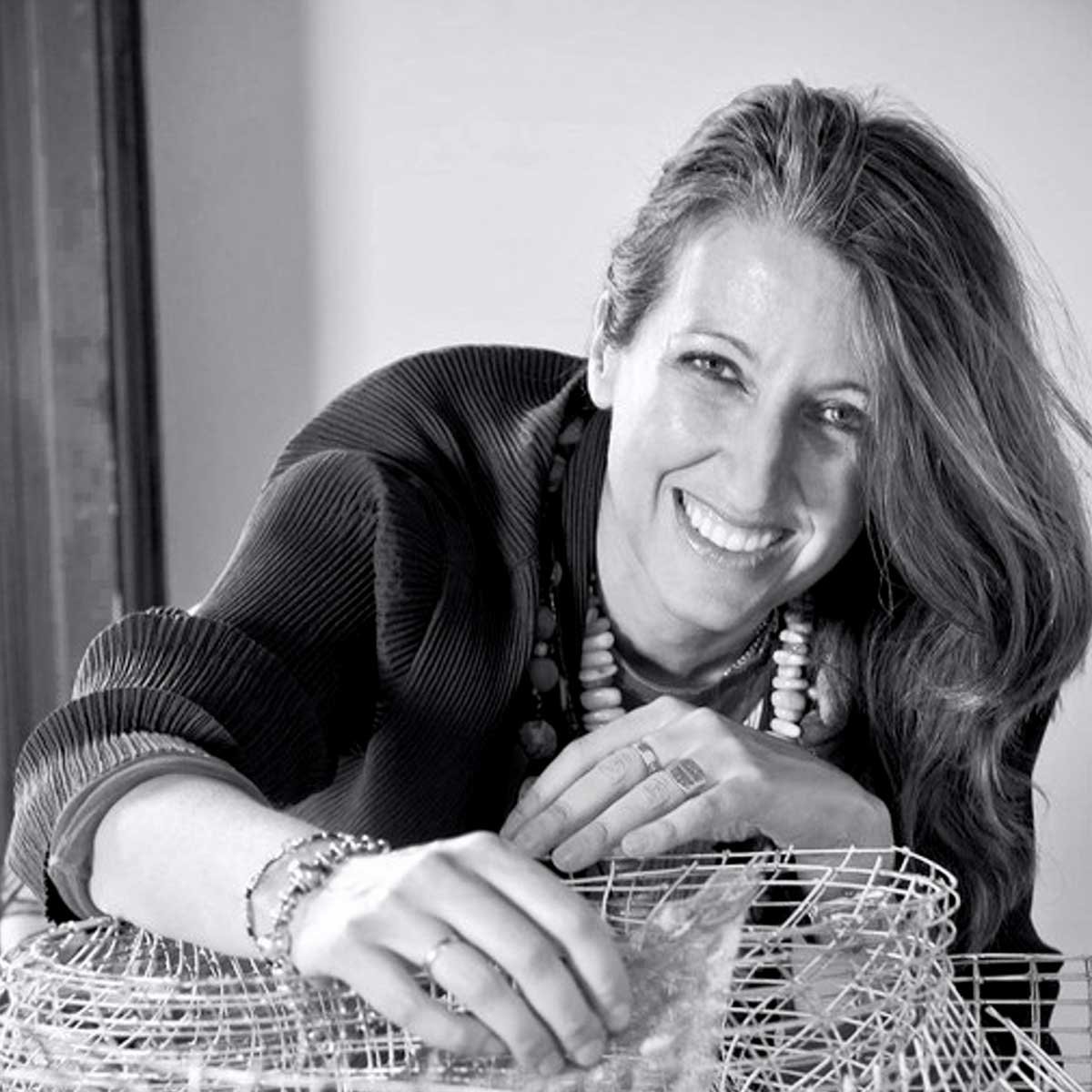
Benedetta Tagliabue
Benedetta Tagliabue, is an internationally renowned architect founder with Enric Miralles (1955-2000) of the international studio EMBT Architects, with offices in Barcelona (HQ), Shanghai, and Paris. Amongst her most notable works include the New Scottish Parliament Building in Edinburgh, the Santa Caterina Market, the Headquarters of Gas Natural Fenosa and the Diagonal Mar Park in Barcelona, the Spanish Pavilion for World Expo Shanghai 2010 (winner of the prestigious RIBA Best International Building 2011 Award).
Round table discussion
Research in Biodigital Era / Natural & Artificial Intelligence
Synthesis
This round table, moderated by Neil Leach, will be made up of a selection of the authors of the papers presented throughout the day, commenting on advanced research issues, issues on Natural & Artificial Intelligence, and issues on tracks (1) Digital architecture and design: theory, history, and society, (5) Virtual Reality (VR), Augmented Reality (AR), and Mixed Reality (MR), and (6) Interaction design, interfaces, and devices.
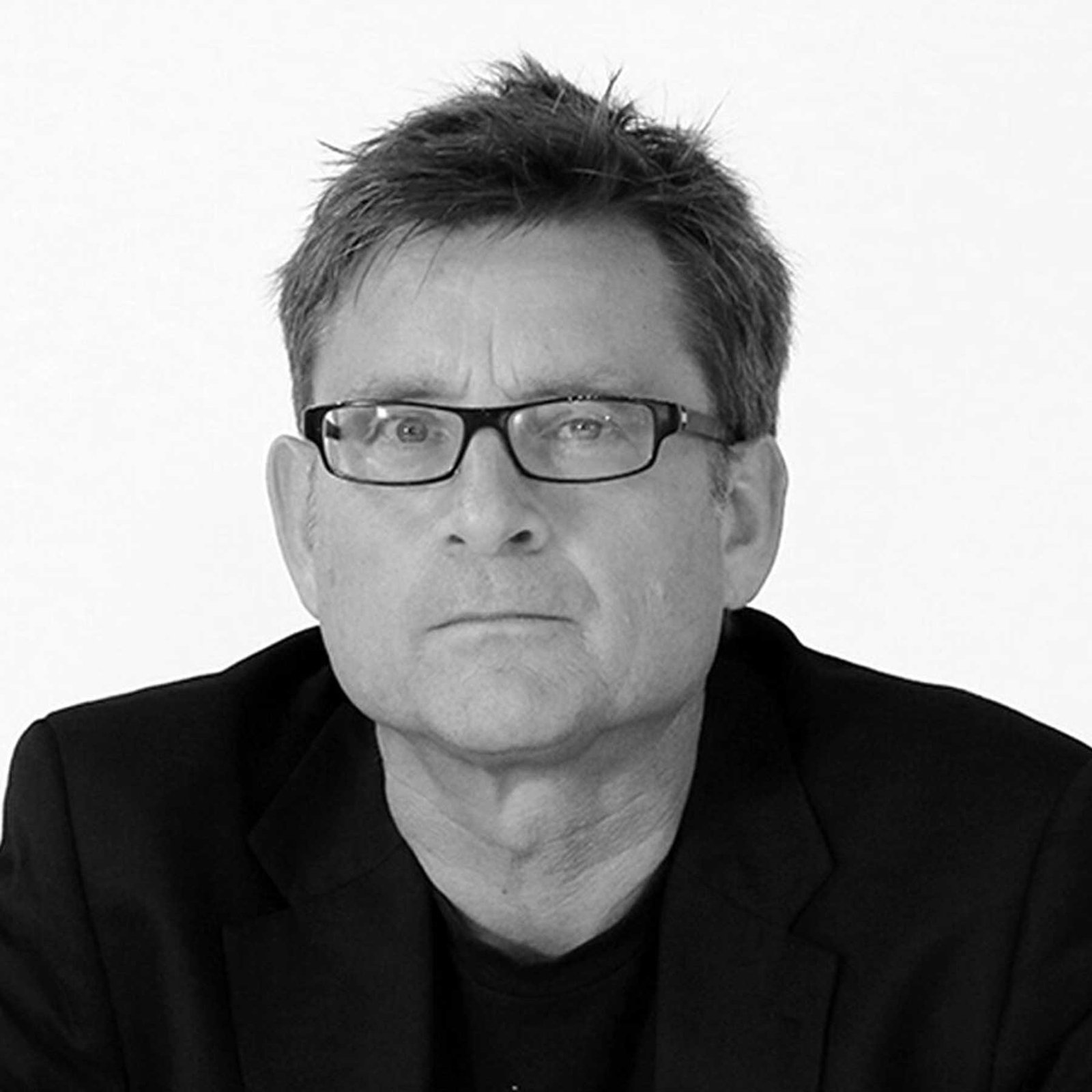
Moderator: Neil Leach
Neil Leach, is a British architect and theorist. He is Professor at Florida International University, the European Graduate School and Tongji University. He has also taught at the AA School of Architecture, Harvard, Columbia, Cornell, SCI-Arc, Southern California, Nottingham, Bath, Brighton, Dessau Institute of Architecture, Royal Danish Academy of Art, etc. He is currently the Director of the Doctor of Design program at Florida International University. He is co-founder of DigitalFUTURES.
Teaching in the Biodigital Era / Biological World (& Digital Intersections)
Synthesis
This round table, moderated by Yomna K. Abdallah, will be made up of a selection of the authors of the papers presented throughout the day, commenting on issues of university teaching, issues about biology in its application to architecture and design, with their corresponding intersections with the digital world, and issues about tracks (2) Education in digital and hybrid contexts, (7) Biodigital architecture, biodigital design and ecosystems, and (8) Artistic practices and creative industries.

Moderator: Yomna K. Abdallah
Yomna K. Abdallah, professor at ESARQ-UIC Barcelona (the School of Architecture of the Universitat Internacional de Catalunya). Deputy Director of the iBAG-UIC Barcelona (Institute for Biodigital Architecture & Genetics) and the Master Program in Biodigital Architecture. Her research interest is focused on embedding bioactive agents in the built environment, through biomaterials, Engineered living materials and biosystems (bioreactors). Co-author of many research papers and projects on her research line.
Practice in the Biodigital Era / Digital World (& Biological Intersections)
Synthesis
This round table, moderated by Rosa Cervera, will be made up of a selection of the authors of the papers presented throughout the day, commenting on issues of professional practice, issues about digital in its application to architecture and design, with their corresponding intersections with the biological world, and issues about tracks (3) Digital fabrication, robotics and automation, (4) Parametric design, generative design, and Building Information Modeling (BIM), and (9) Performance, simulation, and analytics.
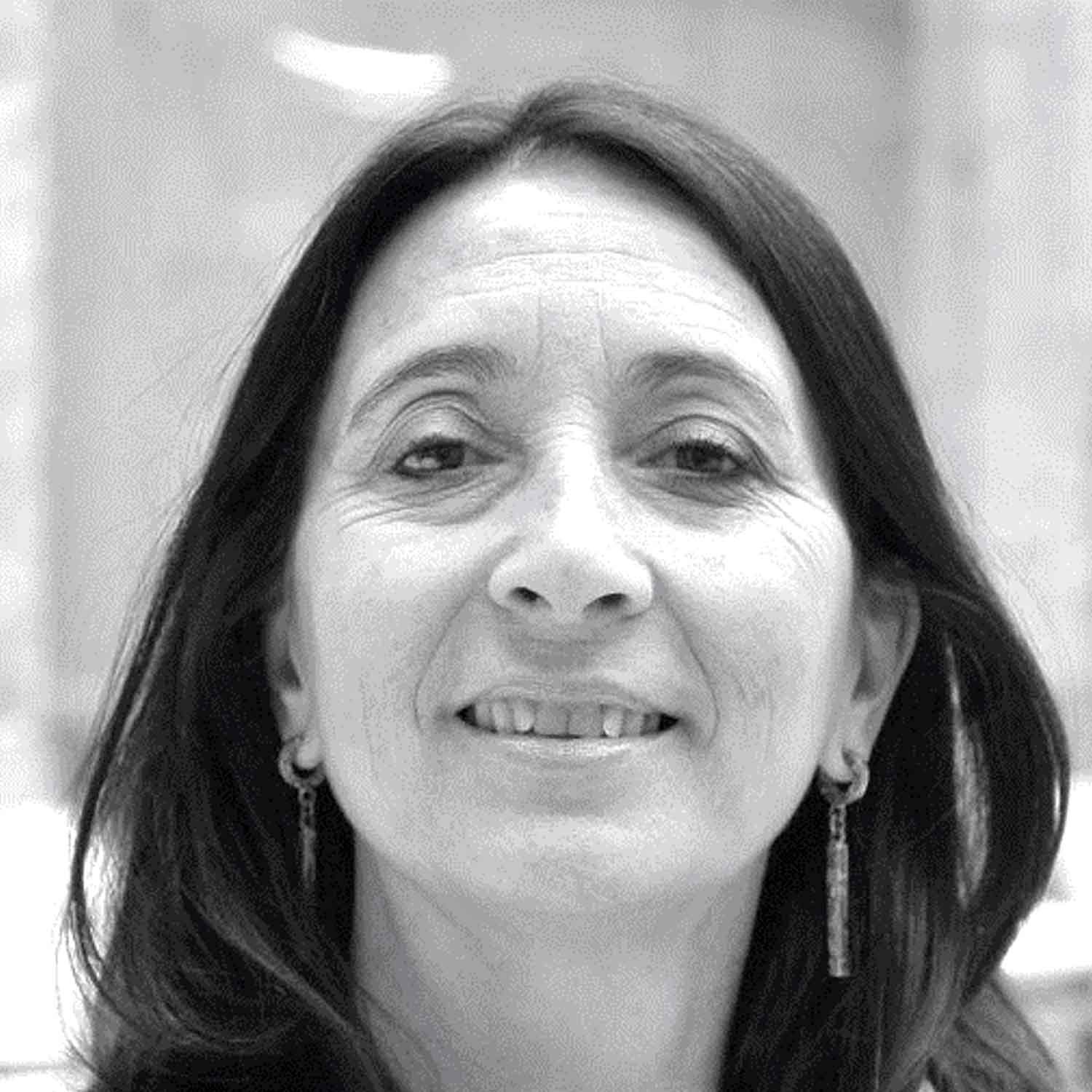
Moderator: Rosa Cervera
Rosa Cervera, architect (ETSAM, 1978), doctor (UPM, 1989), and internationally recognized for her research on sustainable and bionic architecture. She has taught Composition and in several university master’s degrees, such as the University Master’s Degree in Advanced Architecture and City Projects. She has been Director of the School of Architecture at the University of Alcalá (2004-07), Professor since 2018, and professor at various universities, such as Columbia (2009-10) and Miami (2015).
Dates
Important dates
April 08
Deadline for Abstract Submission
May 17
Notification of Abstract Acceptance
July 22
Deadline for Full Paper Submission
September 02
Notification of Full Paper Acceptance
September 30
Submission of final conference papers
October 07
Deadline for Registration
November 04 - 08
Online workshops
November 13 - 15
Conferences
After November 15: enjoy Barcelona!
Submissions
Stage 1: Call for abstracts SIGraDi 2024 is closed
We are pleased to announce the call for abstracts for the SIGraDi 2024 Conference. We invite you to submit abstracts of academic research and professional practice by April 8th. Abstracts must be original and unpublished, they cannot be sent simultaneously to another conference or journal, and they must be written following the guidelines of the APA 7th standard in one of the three official SIGraDi languages (Spanish, Portuguese, or English). The texts must contain 450 – 550 words in addition to references and be organized according to the following structure.
Title: The name of the work must be concise and consistent with the purpose of the study.
Keywords: 5 keywords (mandatory) that identify the project.
Introduction: General and specific problems, objectives, and relevance.
Methodology: Methods, stages, and techniques.
Results: Key findings or expected results.
Discussion: Contribution and impact.
References: Relevant sources.
Evaluation criteria
The text of the abstract should not mention the names of the authors or their institutions. The abstracts will be reviewed by a blind international scientific committee under the following criteria:
- General organization.
- Concordance with the main theme or tracks.
- Originality.
- Relevance.
- Quality of the methodology.
- Quality of references.
Publications
Authors with accepted abstracts will be able to submit their full articles for a second phase of blind review. The accepted full texts will be published in the Proceedings book with ISBN and on the Cumincad Open Access platform.
Stage 2: Full conference paper SIGraDi 2024
Deadline for full paper submission: July 22
*This stage is only for authors accepted in abstract stage.
Welcome to the SIGraDi 2024 Conference Full Paper Stage submission process.
Keep in mind that to be author, present your text as oral presentation, publish it in the SIGraDi 2024 Proceedings book and Cumincad database it is mandatory to be ACCEPTED in the FULL PAPER stage.
Check list:
- Use the template and check font sizes, justification, margins, etc.
- Number of pages strictly 10 or 12 (Abstract, Keywords, Content, Figures, Tables, and References), not 9, not 11, not 13 pages.
- The Title, Abstract and Keywords must be in English.
- The content must be in Portuguese, English or Spanish, please dont mix languages.
- The APA 7 reference style must be used.
- All Figures must indicate authorship.
- Do not use footnotes or page numbers in any part of the paper.
- Author or institution information should be omitted in the blind review process.
- Update OpenConf Profile.
- Upload your submission, only an unique file in PDF.
Download Full paper Template
Please review for a few minutes the following information that contextualizes the use of template (Download DOCX file), update your submission (upload PDF file), update new information (OpenConf), and the criteria to evaluate your submission.
Download Full paper Template on this link:
The submissions should include only *.pdf files. The files should be named according to their ID number (i.e., ID_100.pdf).
Author or institution information should be omitted in the blind review process.
The extension of the Conference Papers is strictly 10 or 12 pages (not 9, not 11, not 13 pages), and between 2500 and 3500 words depending on the number of figures, tables, and references.
The paper title, abstract and keywords are in English, to disseminate the works internationally and meet indexing requirements. For this submission and oral presentations, authors can use any of the official languages of SIGraDi (Spanish, Português or English).
Update your information
If you have made changes at this stage, it is imperative that you update that information in OpenConf (eg author names, submission title, email, etc).
Update your information on this link:
The Conference Paper will be peer-reviewed by an International Scientific Committee with recommendations under the following evaluation criteria:
- Concordance with the main theme of the conference Critical Appropriations and tracks
- Originality of the topic, research problem or project. The conference paper should contain original research that has neither been published nor submitted for publication elsewhere.
- Relevance of the contribution to the field.
- Methodology or techniques used;
- Quality of references;
- General organization of the conference paper according to the guidelines.
Conference Proceeding Book and Index. The accepted conference papers will be published in the Conference Proceedings (ISBN), as well as on the Cumin CAD database.
Invitations to Journals
Authors with conference papers with the highest scores will be invited to present an extended version for the International Journal of Architectural Computing (IJAC), published by SAGE Journal, as well as for the journal Gestão & Tecnologia de Projetos published by the Universidade de São Paulo.
As this is a blind review process, the Conference Paper should not mention the names of the authors or the institution, nor any indication of authorship. Each registration in the congress will allow one publication and one presentation.
* Upload your submission only an unique file in PDF
If you have questions, please contact to the SIGraDi 2024 team at the following email: sigradi2024@sigradi.org
Workshops
Online workshops
Open call for proposals
SIGraDi 2023 workshops images
We are pleased to invite you to submit your proposals for the SIGraDi 2024 online workshops. This is a unique opportunity to reflect and share your knowledge on the application of digital and biodigital intelligent systems in architectural design and art, from research, teaching, and professional practice perspectives.
Below are the most relevant details for this 2024 call:
Selection Criteria for Instructors:
- Previous experience in workshops
- Coherence in handling the topic and performance
- Previous or current participation in SIGraDi (although open to all)
- Use of free or educational software
- Short CV, consistent with the workshop topic (1-page summary)
Topics to Consider:
- BioDigital Architecture and Design
- Digital-Driven Industrial and Product Design
- Digital-Driven Fashion, Textile and Jewelry Design
- Digital-Driven Urban Design
- Coding
- Artificial Intelligence
- VR/AR/XR
- Robotics for Architecture and Design
- Additive Manufacturing (simulation)
- Parametric, Generative design / BIM
- Performance-based Design
- Hacker / Maker Culture
*The workshops can be taught in Spanish, Portuguese or English.
Important Dates:
- Proposal submission deadline: August 12, 2024
- Confirmation of accepted workshops: September 9, 2024
- Online workshops: November 4-8, 2024
Workshop results will be part of the closing ceremony in Barcelona, being also included in the SIGraDi 2024 Proceedings Book with their respective tutors and participants, digital certificates will be included.
We look forward to your valuable participation and hope you can contribute your experience and knowledge to this space of learning and collaboration through the following link:
Google Forms: Sign-in
Access Google Forms with a personal Google account or Google Workspace account (for business use).
docs.google.com
For inquiries, contact: sigradi.oficial@gmail.com
Registration
SIGraDi 2024 in person conference registration
PAYMENT LINKS WILL BE AVAILABLE LATER
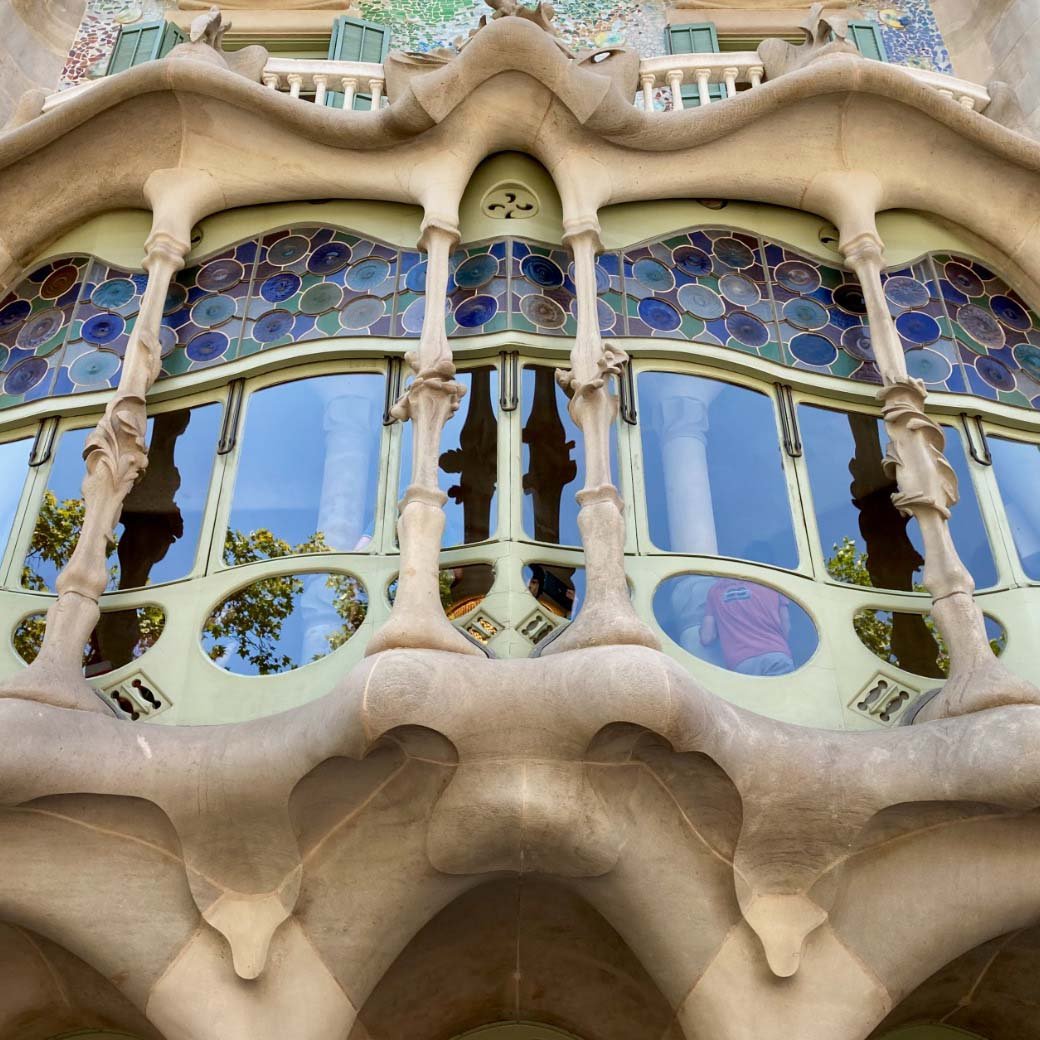
Author
€250
Author fee gives full access to all the conference activities, including keynotes and thematic tracks presentations, round tables, social activities, online workshops, and one-year membership in SIGraDi. Each author can publish up to a maximum of two full papers with this fee; the accepted full texts will be published in the Proceedings book with ISBN and on the Cumincad Open Access platform.
*Online workshops will be during the previous week of the conferences and with limited availability. You can only participate in one workshop for each payment.
*Gala dinner is not included in this registration payment.
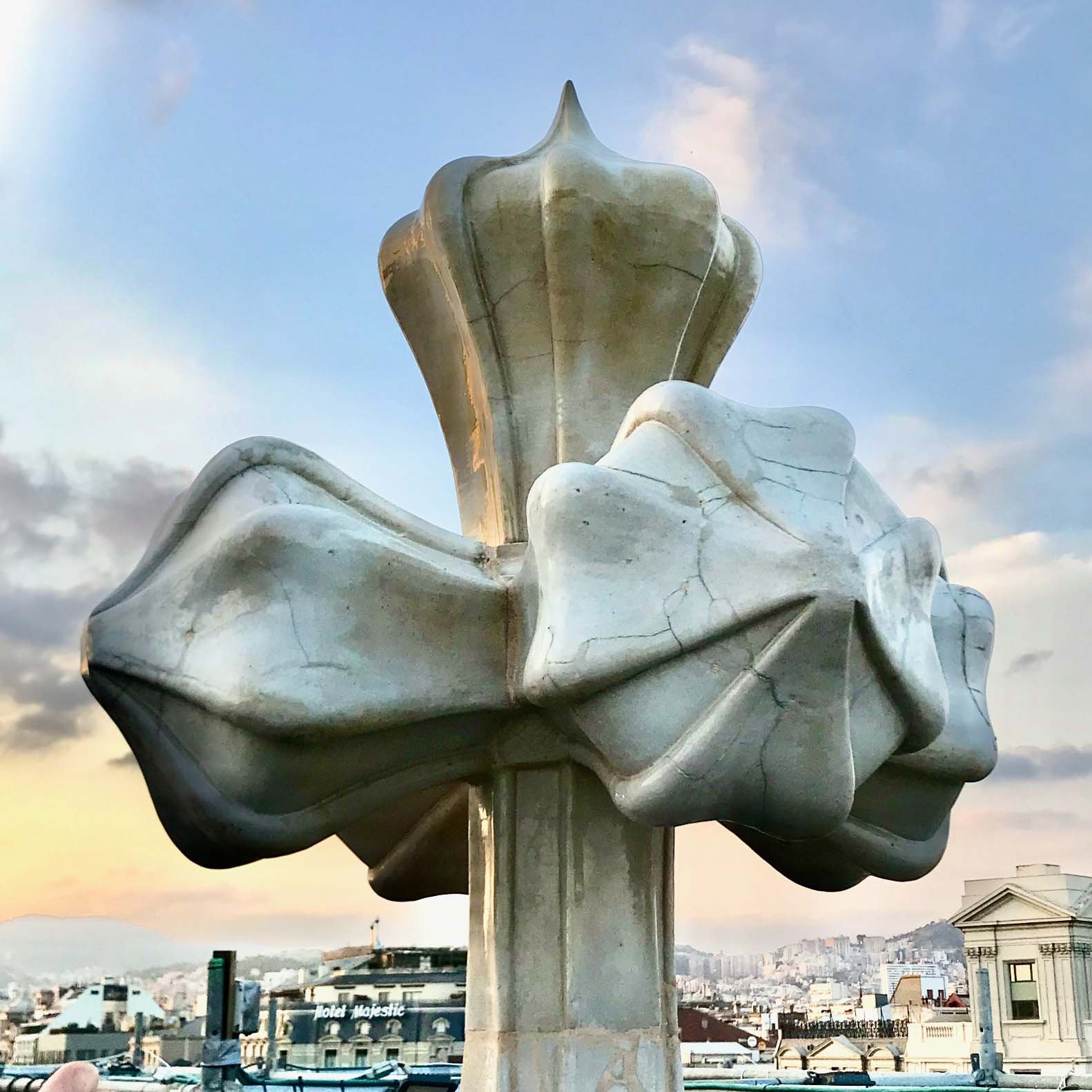
Attendee
€250
Attendee fee gives full access to all the conference activities, including keynotes and thematic tracks presentations, round tables, social activities, online workshops, and one-year membership in SIGraDi. Attendee fee does not include to do a conference presentation and full paper publication.
*Online workshops will be during the previous week of the conferences and with limited availability. You can only participate in one workshop for each payment.
*Gala dinner is not included in this registration payment.
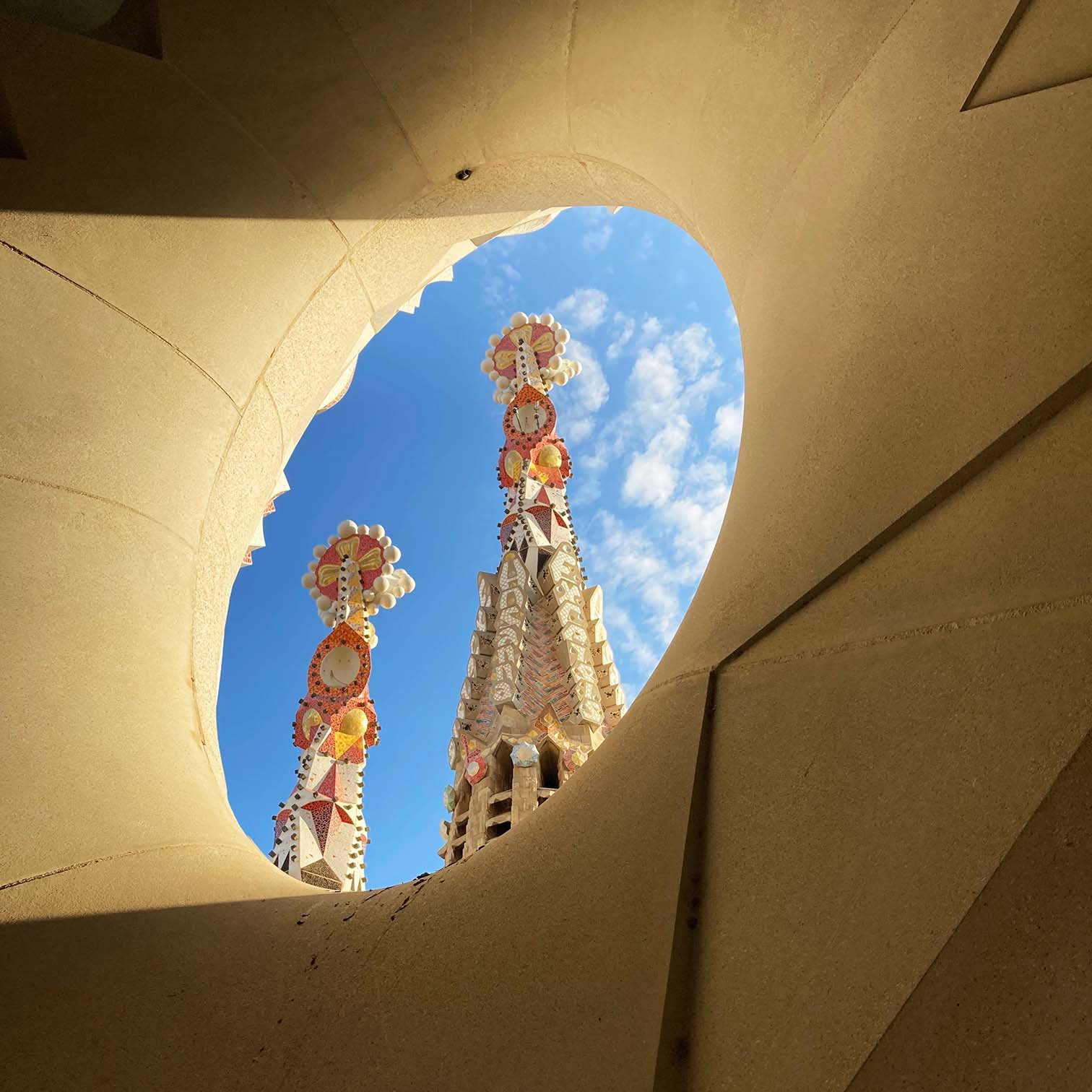
Student
€150
Student (Bachelor) fee gives full access to all the conference activities, including keynotes and thematic tracks presentations, round tables, social activities, online workshops, and one-year membership in SIGraDi. Student fee does not include to do a conference presentation and full paper publication.
*Online workshops will be during the previous week of the conferences and with limited availability. You can only participate in one workshop for each payment.
*Master and Doctorate student are not included in this category.
*Gala dinner is not included in this registration payment.
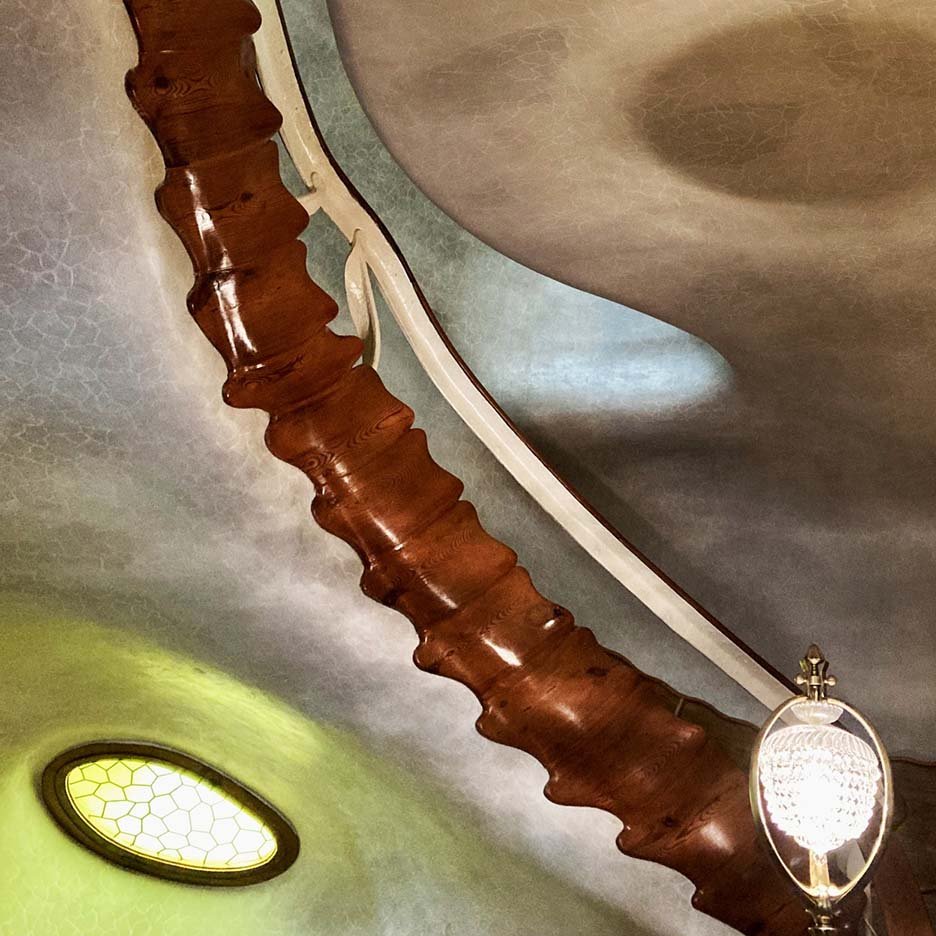
Only membership
€33
Membership fee gives only one-year membership in SIGraDi and does not give access to conference activities. Membership fee does not include to do a conference presentation and full paper publication.
*Gala dinner is not included in this registration payment.
FAQs
Frecuently Asked Questions
How to get to UIC Barcelona?
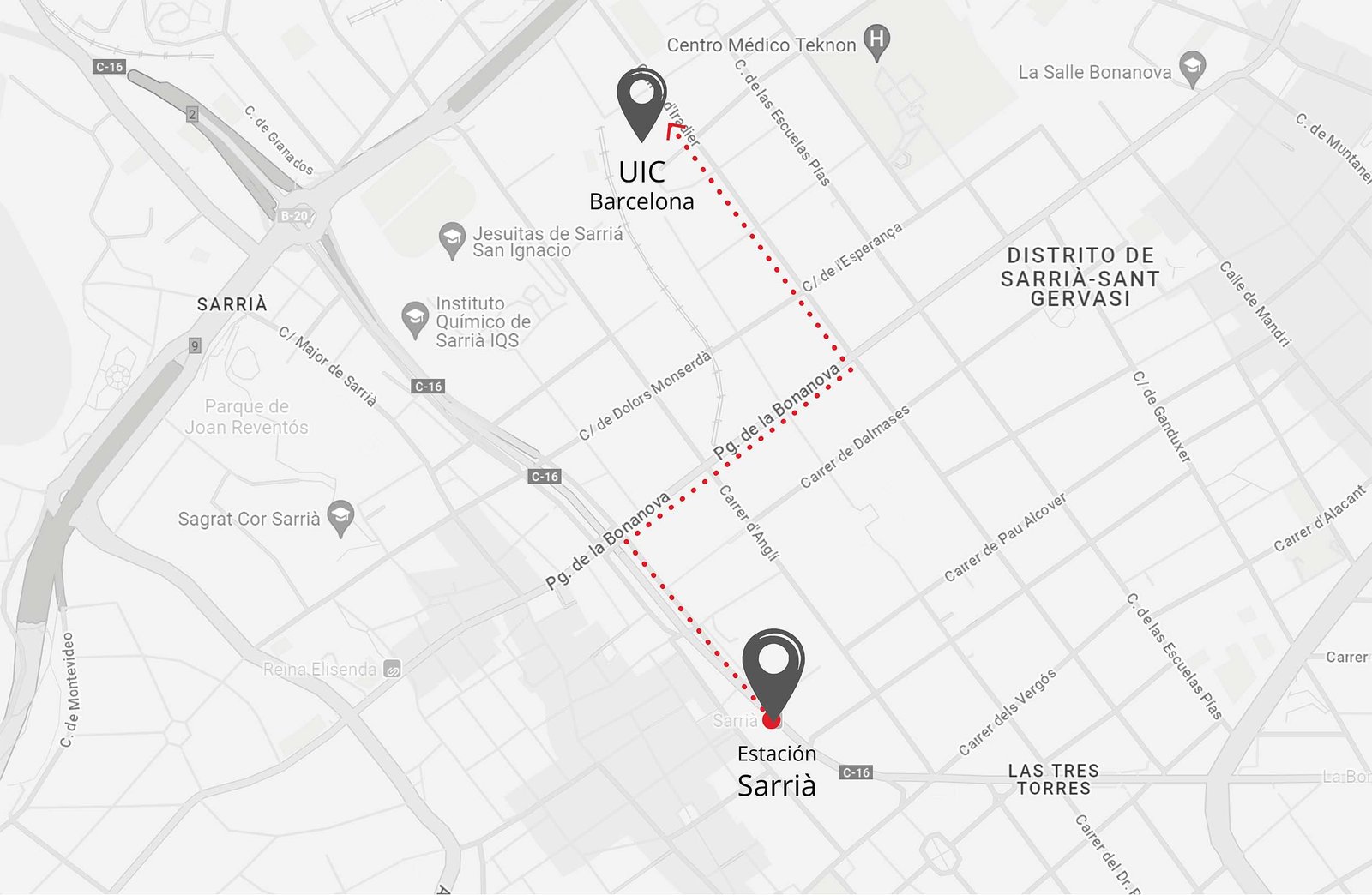
About 20 minutes walking distance, 1.3 kilometers away from UIC Barcelona.
Where to stay?
Visit the following link and see all the options near to UIC.
Google maps link
Where to eat?
See all dining options near UIC Barcelona.

